September 2025 – BOQ International Phone Number Spoofing
We are alerting customers to a sophisticated scam involving callers impersonating BOQ Group's BOQ/ME or Virgin Money banks fraud team. Calls have been made to BOQ Group customers that are appearing to come from our international phone number +613 9708 4001. During these calls, it has been reported that the callers have been using famous names such as Jamie Oliver, or Mark Zuckerberg.
How to identify the scam call:
- Scammers are calling under the guise of preventing fraudulent transactions on the account.
- Callers will ask for account sensitive information such as passwords, card numbers, log details and pins under the guise of completing identity verification.
- Scammers may request for you to download remote access software.
- We do not call customers from this international number.
- If we call you, we will never ask you for any one time pins and will never ask you for your full card number.
What to do if you suspect a scam?
- If you’re ever unsure please terminate the call and contact us on 1300 55 72 72 to confirm if the caller is actually an employee.
- If you have provided remote access, please disconnect your device from the internet and contact us on 1300 55 72 72 immediately.
- Block suspect callers and cease any interactions with the caller.
If in doubt, contact BOQ:
To report a fraud or scam, attend your local branch or call us immediately on 1300 55 72 72 (Monday-Friday, 8am-8pm AEST, and Saturday 9am-5pm AEST).
If you have any concerns about the legitimacy of correspondence, or individuals, you can contact BOQ group directly (either via fraudandscamoperations@boq.com.au or using the details on our Contact Us page).
Report a cybercrime or cyber security incident to the ACSC via ReportCyber at www.cyber.gov.au/report, or call the Australian Cyber Security Hotline on 1300 CYBER! (1300 292 371).
For more tips and resources, visit: https://www.boq.com.au/help-and-support/fraud-and-scams.
September 2025 – BOQ Group Executive Impersonation Fraud
BOQ Group is warning customers about a scam involving forged documents impersonating senior executives. Customers have reported receiving emails appearing to be from Racheal Kellaway, BOQ’s Chief Financial Officer, and Rachel Stock, BOQ’s Chief Risk Officer. These documents falsely verify accounts and use BOQ branding and forged executive signatures to appear legitimate.
Scammers may use these materials to solicit sensitive information or financial transactions. Engaging with these documents may expose individuals to identity theft, financial loss, or reputational harm.
How to Identify and Avoid Impersonation Scams
- Unexpected Requests: Be wary of unsolicited requests for personal or financial information including account verification, payment details, or sensitive personal information. Never click on a link or disclose sensitive information via email or text message.
- Check the Source: Always verify the authenticity of the communication. Look out for email addresses or contact details that appear slightly altered or unfamiliar. Remember phishing messages can be spoofed to appear to be from a genuine source. If in doubt, contact BOQ or the company via a verified contact line to gain advice.
- Look for Red Flags: Poor grammar, misspelled words, and email addresses that don't match the official domain are common indicators of phishing attempts.
- Messages Using Urgent or Pressuring Language: Scammers often use urgency to prompt immediate action. Be cautious of messages that demand quick responses, threaten consequences, or use emotional manipulation to bypass your usual checks.
- Secure Your Information: Use strong, unique passwords for all your accounts and enable multi-factor authentication where available. Check the security of your email, Linked In and social media accounts. Often these phishing emails occur via information that is accessible or compromised.
- Stay Informed: Educate yourself about the latest scam tactics and share this knowledge with your network.
If You Suspect an Impersonation Scam
- Do Not Respond or Click on Links: If you receive a suspicious email or message, do not click on any links or respond to the sender.
- Report It: Contact BOQ's Customer Contact Centre immediately to report the incident and verify the legitimacy of the communication. You can also report suspected phishing attempts to ScamWatch or the company you believe is being impersonated.
- Protect Your Accounts: Change your passwords regularly and monitor your accounts for any unusual activity.
If in doubt, contact BOQ:
To report a fraud or scam, attend your local branch or call us immediately on 1300 55 72 72 (Monday-Friday, 8am-8pm AEST, and Saturday 9am-5pm AEST).
If you have any concerns about the legitimacy of correspondence, or individuals, you can contact BOQ group directly (either via fraudandscamoperations@boq.com.au or using the details on our Contact Us page).
Report a cybercrime or cyber security incident to the ACSC via ReportCyber at www.cyber.gov.au/report, or call the Australian Cyber Security Hotline on 1300 CYBER! (1300 292 371).
For more tips and resources, visit: https://www.boq.com.au/help-and-support/fraud-and-scams.
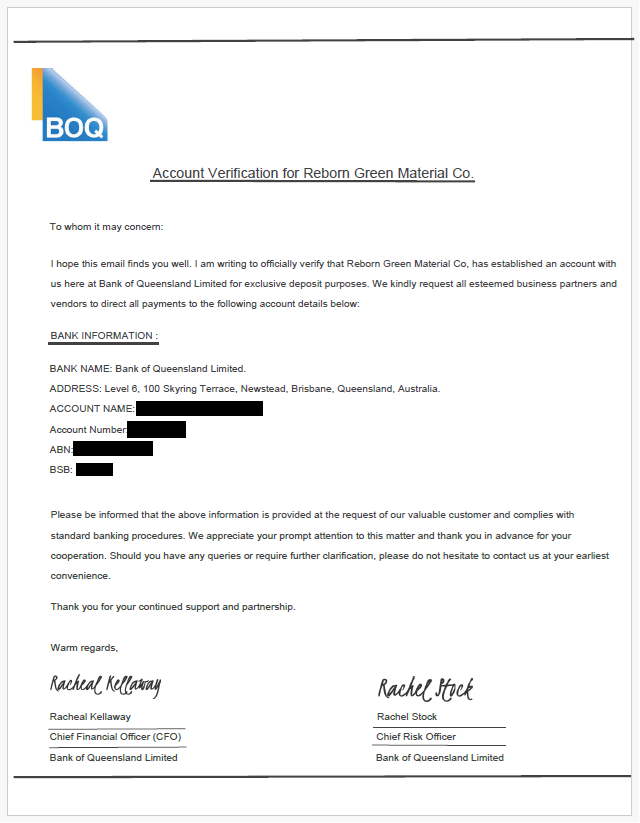
August 2025 – Renting and Selling Accounts
BOQ has identified a new trend where customers are encouraged to sell or rent their bank accounts. Once in the hands of the scammers, they will then use your account to move criminal & illegitimately obtained funds between various financial institutions to launder money.
This not only leads to accounts being permanently closed & the debanking of your profiles, but also significant legal consequences for the owner of the now rented bank account.
Sometimes, the renting of your bank account can start as a simple job opportunity promising a consistent flow of money online. After building your trust over several transfers into your account, they will then look to take control of your account & even ask you to start depositing your own money.
The main way victims are targeted for “scambling” are through engaging with unregulated online gambling websites, typically advertised through social media platforms like Facebook.
These platforms encourage the participants to make frequent small transactions allowing for fraudulent funds to be moved in small amounts between multiple financial institutions.
What to look for:
- Be wary of any ads offering funds in return for minimal work
- Do not provide any banking access or personal information to unfamiliar contacts
- Avoid engaging in any online gambling you found through social media
- Any job opportunities that request you send them money to receive any funds
- Be wary of any third parties that are instructing you to create new bank accounts or instructing you on what to do with your funds
How to protect yourself:
- Don’t share banking and personal details with anyone you don’t know or trust
- Do not allow anyone to ‘borrow’ your bank account
- Before engaging in any job opportunities research the legitimacy of the offer and company
- Be cautious of any opportunities offering unrealistic salaries or seem to ‘good to be true’
If in doubt, contact BOQ:
- To report a fraud or scam, attend your local branch or call us immediately on 1300 55 72 72 (Monday-Friday, 8am-8pm AEST, and Saturday 9am-5pm AEST).
- If you have any concerns about the legitimacy of correspondence, or individuals, you can contact BOQ group directly (either via fraudandscamoperations@boq.com.au or using the details on our Contact Us page).
- Report a cybercrime or cyber security incident to the ACSC via ReportCyber at www.cyber.gov.au/report, or call the Australian Cyber Security Hotline on 1300 CYBER! (1300 292 371).
- For more tips and resources, visit: https://www.boq.com.au/help-and-support/fraud-and-scams
Relevant websites - https://www.afp.gov.au/news-centre/media-release/stop-cashing-crooks-australians-urged-not-rent-or-sell-bank-accounts-cash
July 2025 – BOQ Branded Phishing Scam
BOQ Group has identified a new phishing scam targeting customers via SMS and email. These fraudulent messages are designed to trick recipients into providing personal and banking information by impersonating BOQ and claiming your BOQ account has been restricted.
It is crucial to stay vigilant and be aware of the signs of these fraudulent attempts.
How to Identify and Avoid Phishing Scams
The phishing messages:
- Claim to be from BOQ and request customers to log in to confirm security information, as pictured to the right.
- Include a “Confirm Now” link.
- Threaten card restrictions or account suspension if action is not taken.
These messages are not legitimate and should be deleted immediately.
How to protect yourself from phishing scams:
- Don’t click on any unexpected emails or SMS.
- Only use trusted applications and websites for banking.
- Never provide remote access to your device or PC.
- Do not share your banking credentials, PINs, or verification codes with anyone.
If in doubt, contact BOQ:
To report a fraud or scam, attend your local branch or call us immediately on 1300 55 72 72 (Monday-Friday, 8am-8pm AEST, and Saturday 9am-5pm AEST).
If you have any concerns about the legitimacy of correspondence, or individuals, you can contact BOQ group directly (either via fraudandscamoperations@boq.com.au or using the details on our Contact Us page).
Report a cybercrime or cyber security incident to the ACSC via ReportCyber at www.cyber.gov.au/report, or call the Australian Cyber Security Hotline on 1300 CYBER! (1300 292 371).
For more tips and resources, visit: https://www.boq.com.au/help-and-support/fraud-and-scams
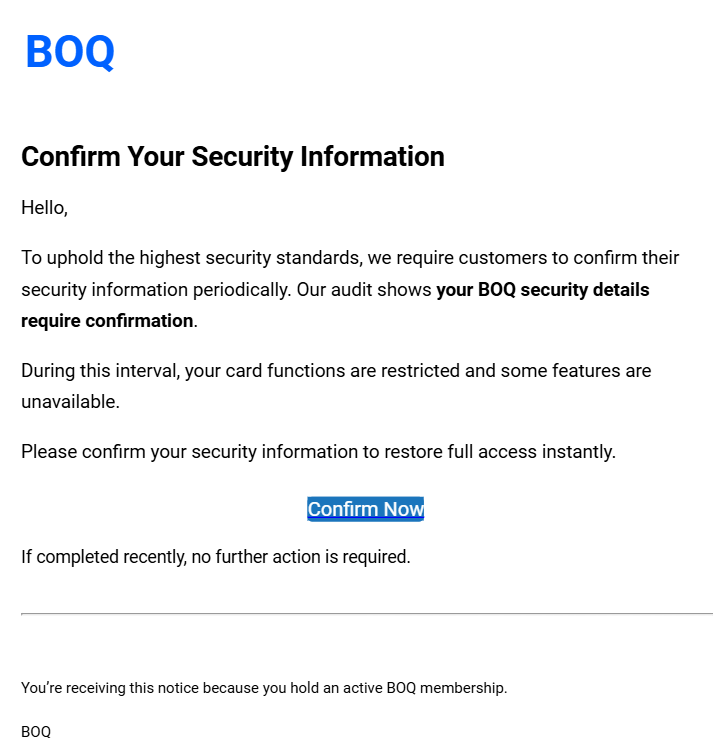
July 2025 – Qantas Cyber Incident
BOQ has been made aware of a recent cybersecurity event affecting Qantas, which has led to the unauthorised disclosure of certain customer details, including names, email addresses, and phone numbers. If you are a Qantas customer, please exercise caution, as this information may be exploited in phishing or social engineering scams.
Increased Risk of Scams
The compromised data may be used by scammers to conduct targeted phishing or impersonation attempts. These scams often appear credible and aim to extract sensitive information.
What to look out for:
- Be wary of unexpected communications—calls, texts, or emails—claiming to be from Qantas.
- Avoid clicking on suspicious links or downloading unknown attachments.
- Do not disclose personal or financial information to unfamiliar contacts.
Reporting Suspicious Behaviour:
- If you receive a message pretending to be from Qantas, report it through their official support channels.
- If you’ve shared sensitive details or transferred funds in response to such a message, contact BOQ immediately at 1300 55 72 72 (Mon–Fri 8am–8pm AEST, Sat 9am–5pm AEST) or visit your local branch.
- You can also report cybercrime to the Australian Cyber Security Centre (ACSC) via ReportCyber or by calling 1300 CYBER1 (1300 292 371).
Stay Updated:
- For the latest information on the Qantas incident, visit: Qantas Cyber Incident Information
- For BOQ Group’s current scam alerts and fraud prevention advice, visit: BOQ Fraud and Scams Support
May 2025 – Spoofing Scam
BOQ Group is warning customers about an increase in spoofing scams. Customers have reported receiving calls claiming to be from the BOQ Security Team. During these calls, scammers claim to be from the BOQ Security Team and attempt to convince the customer that there has been suspicious activity on their account.
These scammers may attempt to obtain sensitive information such as personal details, card numbers, internet banking credentials, and one-time passcodes (OTPs).
How to Identify and Avoid Bank Impersonation Scams:
- Unexpected Contact: Be cautious of all calls claiming to be from BOQ.
- Identification Questions: Scammers will try to obtain your identification information, card details, OTP sent to your phone, and the answers to your security questions. They may use scare tactics if you refuse to answer.
- Check the Source: If unsure about the authenticity of a call, hang up and contact BOQ directly using the public number or email fraudandscamoperations@boq.com.au.
If You Suspect a Bank Impersonation Scam Call:
- Do Not Engage: If you receive an unsolicited call, do not provide any identification information or OTPs. End the call and contact the bank using the numbers listed on the public website.
- Stay Calm: Scammers may use scare tactics to get you to engage, such as claiming there has been a large unauthorised transaction or a suspicious sign-in on your account. Always contact BOQ through official channels so the fraud team can assess your accounts.
- Report It: Contact BOQ to report the incident. We can provide further advice and support to help you avoid the scam and protect yourself.
If in doubt, contact BOQ:
To report a fraud or scam, attend your local branch or call us immediately on 1300 55 72 72 (Monday-Friday, 8am-8pm AEST, and Saturday 9am-5pm AEST).
If you have any concerns about the legitimacy of correspondence, or individuals, you can contact BOQ group directly (either via fraudandscamoperations@boq.com.au or using the details on our Contact Us page).
Report a cybercrime or cyber security incident to the ACSC via ReportCyber at www.cyber.gov.au/report, or call the Australian Cyber Security Hotline on 1300 CYBER! (1300 292 371).
For more tips and resources, visit: https://www.boq.com.au/help-and-support/fraud-and-scams
May 2025 – Business Email Compromise Scam Warning
BOQ is aware of a high volume of Business Email Compromise (BEC) scams currently circulating in Australia and targeting our customers. BEC scams involve fraudsters impersonating a trusted business contact or executive to trick you into transferring money or sensitive information. These scams often use spoofed email addresses, fake invoices, and urgent requests to deceive you into believing they are legitimate.
It is important to verify the authenticity of any email requesting financial transactions or sensitive information.
Warning signs to look out for:
- Unexpected or unusual requests for payment or sensitive information, especially if they come from a high-ranking executive or trusted business partner.
- Emails that create a sense of urgency or pressure, urging you to act quickly to avoid negative consequences.
- Requests to change payment details or redirect funds to a different account, often with a plausible but fake reason.
- Emails with slight variations in the sender's email address, such as misspellings or different domains.
- Poor grammar, spelling mistakes, or unusual language that doesn't match the sender's usual communication style.
If you suspect that you have encountered a BEC scam, you should take the following steps:
- Do not respond to or engage with the scammer, and do not provide any personal or financial information.
- Verify the request by contacting the supposed sender through a known and trusted communication channel, such as a phone call to their official number.
- Stop any payments or transfers you have made or are about to make and contact your bank or financial institution as soon as possible.
- Report the scam to the Australian Cyber Security Centre (ACSC), the ACCC, or Scamwatch, and provide as much evidence as you can.
- Seek professional advice from a licensed financial planner or counsellor if you need help with your financial situation or recovery.
If in doubt, contact BOQ:
To report a fraud or scam, attend your local branch or call us immediately on 1300 55 72 72 (Monday-Friday, 8am-8pm AEST, and Saturday 9am-5pm AEST).
If you have any concerns about the legitimacy of correspondence, or individuals, you can contact BOQ group directly (either via fraudandscamoperations@boq.com.au or using the details on our Contact Us page).
Report a cybercrime or cyber security incident to the ACSC via ReportCyber at www.cyber.gov.au/report, or call the Australian Cyber Security Hotline on 1300 CYBER! (1300 292 371).
For more tips and resources, visit: https://www.boq.com.au/help-and-support/fraud-and-scams
April 2025 – Bank Impersonation Scam
BOQ Group is warning customers about an increase in bank impersonation scams. Customers have reported receiving calls claiming to be from the “BOQ Bank Fraud Team” OR “BOQ Bank Head Office”. During these calls, scammers mention a “suspicious transaction” or a “suspicious sign-in” on your account. They may even reference a recent card compromise and claim to be able to assist you. They will then ask you to provide card details, the One-Time-Pin (OTP) sent to your phone or sensitive personal information such as the codes to your banking app.
How to Identify and Avoid Bank Impersonation Scams:
- Unexpected Contact: Be cautious of all calls claiming to be from BOQ or other banks.
- Identification Questions: Scammers will try to obtain your identification information, card details, OTP sent to your phone, and the answers to your security questions. They may use scare tactics if you refuse to answer.
- Check the Source: If unsure about the authenticity of a call, hang up and contact BOQ directly using the public number or email fraudandscamoperations@boq.com.au.
If You Suspect a Bank Impersonation Scam Call:
- Do Not Engage: If you receive an unsolicited call, do not provide any identification information or OTPs. End the call and contact the bank using the numbers listed on the public website.
- Stay Calm: Scammers may use scare tactics to get you to engage, such as claiming there has been a large unauthorised transaction or a suspicious sign-in on your account. Always contact BOQ through official channels so the fraud team can assess your accounts.
- Report It: Contact BOQ to report the incident. We can provide further advice and support to help you avoid the scam and protect yourself.
If in doubt, contact BOQ:
To report a fraud or scam, attend your local branch or call us immediately on 1300 55 72 72 (Monday-Friday, 8am-8pm AEST, and Saturday 9am-5pm AEST).
If you have any concerns about the legitimacy of correspondence, or individuals, you can contact BOQ group directly (either via fraudandscamoperations@boq.com.au or using the details on our Contact Us page).
Report a cybercrime or cyber security incident to the ACSC via ReportCyber at www.cyber.gov.au/report, or call the Australian Cyber Security Hotline on 1300 CYBER! (1300 292 371).
For more tips and resources, visit: https://www.boq.com.au/help-and-support/fraud-and-scams
March 2025 – BOQ Group CEO Patrick Allaway Impersonation Scam
BOQ Group is warning customers about an increase in rise in scammers posing as Patrick Allaway, the CEO of BOQ. Customers have reported receiving emails appearing to be from Patrick Allaway at BOQ Group. These scammers may attempt to obtain personal information, card numbers, and OTP verification codes from you or request payments to be made.
How to Identify and Avoid Impersonation Scams
- Unexpected Requests: Be wary of unsolicited requests for personal or financial information. Never click on a link or disclose sensitive information via email or text message.
- Check the Source: Always verify the authenticity of the communication. Remember phishing messages can be spoofed to appear to be from a genuine source. If in doubt, contact BOQ or the company via a verified contact line to gain advice.
- Look for Red Flags: Poor grammar, misspelled words, and email addresses that don't match the official domain are common indicators of phishing attempts.
- Secure Your Information: Use strong, unique passwords for all your accounts and enable multi-factor authentication where available. Check the security of your email, Linked In and social media accounts. Often these phishing emails occur via information that is accessible or compromised.
- Stay Informed: Educate yourself about the latest scam tactics and share this knowledge with your network.
If You Suspect an Impersonation Scam
- Do Not Respond or Click on Links: If you receive a suspicious email or message, do not click on any links or respond to the sender.
- Report It: Contact BOQ's Customer Contact Centre immediately to report the incident and verify the legitimacy of the communication. You can also report suspected phishing attempts to ScamWatch or the company you believe is being impersonated.
- Protect Your Accounts: Change your passwords regularly and monitor your accounts for any unusual activity.
If in doubt, contact BOQ:
To report a fraud or scam, attend your local branch or call us immediately on 1300 55 72 72 (Monday-Friday, 8am-8pm AEST, and Saturday 9am-5pm AEST).
If you have any concerns about the legitimacy of correspondence, or individuals, you can contact BOQ group directly (either via fraudandscamoperations@boq.com.au or using the details on our Contact Us page).
Report a cybercrime or cyber security incident to the ACSC via ReportCyber at www.cyber.gov.au/report, or call the Australian Cyber Security Hotline on 1300 CYBER! (1300 292 371).
For more tips and resources, visit: https://www.boq.com.au/help-and-support/fraud-and-scams
February 2025 – BOQ Group Impersonation Scams
BOQ Group is warning customers about an increase in bank impersonation scams. Customers have reported receiving calls claiming to be from the “Virgin Money Fraud Team” or "BOQ Group Fraud Team". During these calls, scammers mention a “suspicious transaction” or a “suspicious sign-in” on your account. They will then ask you to provide the One-Time-Pin (OTP) sent to your phone and the answers to your security questions enabled on your banking app/internet banking .
How to Identify and Avoid Bank Impersonation Scams:
- Unexpected Contact: Be cautious of all calls claiming to be from Virgin Money, BOQ or other banks.
- Identification Questions: Scammers will try to obtain your identification information, OTP sent to your phone, and the answers to your security questions. They may use scare tactics if you refuse to answer.
- Check the Source: If unsure about the authenticity of a call, hang up and contact BOQ directly using the public number or email fraudandscamoperations@boq.com.au.
If You Suspect a Bank Impersonation Scam Call:
- Do Not Engage: If you receive an unsolicited call, do not provide any identification information or OTPs. End the call and contact the bank using the numbers listed on the public website.
- Stay Calm: Scammers may use scare tactics to get you to engage, such as claiming there has been a large unauthorized transaction or a suspicious sign-in on your account. Always contact boq through official channels so the fraud team can assess your accounts.
- Report It: Contact Virgin Money to report the incident. We can provide further advice and support to help you avoid the scam and protect yourself.
If in doubt, contact BOQ:
To report a fraud or scam, attend your local branch or call us immediately on 1300 55 72 72 (Monday-Friday, 8am-8pm AEST, and Saturday 9am-5pm AEST).
If you have any concerns about the legitimacy of correspondence, or individuals, you can contact BOQ group directly (either via fraudandscamoperations@boq.com.au or using the details on our Contact Us page).
Report a cybercrime or cyber security incident to the ACSC via ReportCyber at www.cyber.gov.au/report, or call the Australian Cyber Security Hotline on 1300 CYBER! (1300 292 371).
For more tips and resources, visit: https://www.boq.com.au/help-and-support/fraud-and-scams
Accordion Container placeholder
January 2025 – 'Hi Mum/Dad' Family Impersonation Scams
BOQ is warning customers about an increase in “Hi Mum” or “Hi Dad” scams. Customers are reporting receiving text messages from an unknown number purporting to be the customers son or daughter. These messages will advise you that they have damaged their phone and are contacting you on a new number. They will advise you they have urgent payments to make, which may be for a new phone or for bills that are due that day, in an attempt to convince you to pay funds directly to an account number they provide. They are often very persuasive and articulated in presenting themselves as your genuine son or daughter.
How to identify and avoid family impersonation scams:
Unexpected Message: Be cautious of all approaches you did not initiate, especially if you are asked to send money online.
Look for Red Flags: Look for inconsistencies in the vocabulary and tone of the message. Messages requesting money may become more desperate, persistent, or direct. If you do send money, they continue to ask you to send more.
Check the Source: If unsure about whether the message is genuine, always try and contact the known and trusted number for the source. Confirm the identity of the contact by calling the supposed family member directly via a reliable or previously known contact number
If you suspect a family impersonation scam message:
- Do not engage: if you receive an unsolicited message, do not respond, contact the person who you think the message has come from via there known and trusted number or seek advice if unsure.
- Do not send any money: block the number or delete the message immediately and do not send funds.
- Do not click on any links: if a link is included in the message ensure to avoid clicking.
- Report it: Contact BOQ to report the incident. We can provide further advice and support to avoid the scam and protect yourself.
If in doubt, contact BOQ:
To report a fraud or scam, attend your local branch or call us immediately on 1300 55 72 72 (Monday-Friday, 8am-8pm AEST, and Saturday 9am-5pm AEST).
If you have any concerns about the legitimacy of correspondence, or individuals, you can contact BOQ group directly (either via fraudandscamoperations@boq.com.au or using the details on our Contact Us page).
Report a cybercrime or cyber security incident to the ACSC via ReportCyber at www.cyber.gov.au/report, or call the Australian Cyber Security Hotline on 1300 CYBER! (1300 292 371).
For more tips and resources, visit: https://www.boq.com.au/help-and-support/fraud-and-scams
December 2024 – Online Shopping Scams
As we approach the festive season, it’s important to stay vigilant against scams and fraud. Scammers take advantage of the festive season to imitate genuine brands, websites and delivery services. Shopping scams remain a significant threat, exposing individuals and businesses to risks through fake product listings, deceptive payment requests, and insecure payment avenues.
If you receive suspicious emails or messages, refrain from clicking any links or providing card details. Exercise caution with online shopping deals; if it seems too good to be true, it probably is!
Warning signs:
- Be wary of online advertisements that mimic a genuine retailer that are offering deals that seem too good to be true.
- Requests for payments via bank transfer or virtual currencies.
- Emails and messages regarding undelivered items or fees required for a ‘failed’ delivery.
- Be cautious of unsolicited emails, phone calls, or messages asking for personal or financial information. Scammers often pose as legitimate organisations.
Shop online securely:
- Shop from reputable online retailers.
- Verify the authenticity of any communication you receive. Always contact the organisation directly using official contact details rather than those provided in the suspicious message.
- Safeguard your payment information by refraining from saving your payment information to the web browser or online accounts.
- Regularly check your bank statements and credit reports for any unusual activity. Early detection can help prevent further fraud.
- Update your passwords and use strong, unique passwords for different accounts. Enable two-factor authentication where possible.
If in doubt, contact BOQ:
To report a fraud or scam, attend your local BOQ branch or call us immediately on 1300 55 72 72 (Monday-Friday, 8am-8pm AEST, and Saturday 9am-5pm AEST).
If you have any concerns about the legitimacy of correspondence, or individuals, you can contact BOQ group directly (either via fraudandscamoperations@boq.com.au au or using the details on our Contact Us page).
Report a cybercrime or cyber security incident to the ACSC via ReportCyber at www.cyber.gov.au/report, or call the Australian Cyber Security Hotline on 1300 CYBER! (1300 292 371).
For more tips and resources, visit: https://www.boq.com.au/help-and-support/fraud-and-scams.
November 2024 – Job Scams: Protect Yourself from Fake Employment Offers
BOQ is warning customers about a surge in job scams, where fraudsters pose as legitimate employers to deceive job seekers. According to ScamWatch data for 2024, job-related scams have become one of the most common types of fraud this year, with Australians losing a staggering $8,536,115 to these scams so far. This figure is based on just 2,400 reported incidents, so the total losses are likely much higher, as many scams go unreported.
Scammers often target job seekers through platforms such as LinkedIn, Instagram, email, social media, messaging apps, and job boards. These fraudulent offers can appear convincing, with scammers claiming to represent well-known companies.
Scammers often lure victims with promises of high-paying, flexible, or work-from-home roles. Some of these "opportunities" might even claim to pay commissions for engaging with social media posts. They may request sensitive personal details like your full name, date of birth, address, or even financial information. In some cases, they also ask for upfront payments for supposed background checks, training, or equipment—all clear red flags of a scam.
How to Identify and Avoid Job Scams
Too Good to Be True: If a job offer seems too good to be true (e.g., unusually high salaries for little work), it probably is. Scammers often lure victims with promises of easy money or unrealistic benefits.
Unsolicited Job Offers: Be cautious if you receive a job offer that you didn’t apply for, especially if it arrives out of the blue. Legitimate employers always interview candidates before offering jobs.
Requests for Personal or Financial Information: Never share sensitive personal information—such as your bank account details, passwords, or payment for supposed background checks—without verifying the legitimacy of the offer.
Suspicious Communication: Be wary of any communication that seems rushed, contains poor grammar, or lacks professional formatting. Scammers often send generic, poorly written emails or messages.
Fake Websites: Some scammers create fake job portals or websites that closely mimic legitimate company sites. Always check the website’s URL to ensure it is the official site before entering any personal information.
Generic Email Addresses: Be cautious of job offers from email addresses that don’t use a company domain (e.g., @gmail.com or @yahoo.com) instead of an official company email address.
Requests for Upfront Payments: Never pay for job opportunities, training, or background checks. Legitimate employers will not ask for payment.
Be Mindful of Being Added to Large Chat Groups: Scammers might add you to large group chats to create a false sense of legitimacy, showing fake "job offers" and "success stories." Legitimate companies rarely use random group chats for hiring.
What to Do If You Suspect a Job Scam
Do Not Provide Personal Information: Never give out your personal details, banking information, or identification documents unless you're certain the job offer is legitimate.
Verify the Job Offer: If you receive a suspicious job offer claiming to be from BOQ or another company, contact the company directly using their official website or phone number to verify the offer.
Report the Scam: If you believe you've encountered a job scam, report it immediately to BOQ via our customer contact centre. We can help you assess whether the offer is genuine and advise you on how to proceed.
Protect Your Personal Information:
Always verify job opportunities through official channels, such as trusted recruitment agencies or company websites.
Do not respond to unsolicited job offers, and avoid sharing personal details with unknown or unverified sources.
If in doubt, Contact BOQ:
To report a fraud or scam, visit your local BOQ branch or call us at 1300 55 72 72 (Monday to Friday, 8am–8pm AEST, and Saturday 9am–5pm AEST).
If you have concerns about the legitimacy of a job offer or communication, you can contact BOQ directly via fraudandscamoperations@boq.com.au or through the details on our Contact Us page.
For more information on staying safe from job scams, visit: https://www.boq.com.au/help-and-support/fraud-and-scams.
Stay vigilant and protect your personal information.
October 2024 - Third Party Unsolicited Calls
BOQ would like to warn customers of a new scam trend involving third parties who contact you via a phone call posing as a legitimate organisation and request your personal information. According to the ScamWatch 2024 statistics, phone call is the second most common contact method for a scam to be initiated. Customers have reported that they are receiving phone calls from scammers who impersonate the bank or other legitimate organisations. The scammer will tell you that there is an urgent matter in relation to your accounts or products and request information from you such as your identification documents, bank or card details and one-time verification codes. They are often very persuasive and articulated in presenting themselves as a legitimate organisation representative.
How to Identify and Avoid Third Party Calls
- Unexpected Calls, Emails or Messages: Be cautious of any type of communication regarding your banking products. It is important to remember that BOQ will never ask for banking specific details such as your password or login credentials.
- Check the Source: Complete an open source-search online for the name of the organisation and phone number of the third party, who have contacted you, with the words ‘scam’ or ‘complaint’, to identify scams.
- Look for Red Flags: If via phone call, look for signs of a bad phone connection, a sense of in their communication, requests for personal information including one-time verification codes and/or requests for payments to be made via internet banking or card transactions.
If You Suspect an Impersonation Scam Call
- Do Not Engage in Unsolicited Calls: If you receive an unsolicited call, hang up and check the legitimate organisations website for the correct contact information.
- Do Not Send Any Money: Block all contacts immediately.
- Do Not Download Applications or Click on Any Links: Do not download any application at the request of a third party on an unsolicited call. If a text message is received during the call do not click on any links that may be provided.
- Report It: Get in contact with BOQ via our customer contact centre to report the incident. We can advise of how to stay safe in these incidences, whether the communication is fraudulent or not and how to handle these attempts now and in the future.
· Protect Your Accounts: Never give your bank details or personal information to a third party. Do not make transactions at the request of a third party.
If in doubt, contact BOQ:
To report a fraud or scam, attend your local branch or call us immediately on 1300 55 72 72 (Monday-Friday, 8am-8pm AEST, and Saturday 9am-5pm AEST).
If you have any concerns about the legitimacy of correspondence, or individuals, you can contact BOQ group directly (either via fraudandscamoperations@boq.com.au or using the details on our Contact Us page).
Report a cybercrime or cyber security incident to the ACSC via ReportCyber at www.cyber.gov.au/report, or call the Australian Cyber Security Hotline on 1300 CYBER! (1300 292 371).
For more tips and resources, visit: https://www.boq.com.au/help-and-support/fraud-and-scams
September 2024 - Digital Wallet Scams
BOQ Group is reminding customers to be aware of Digital Wallet Phishing Scams. This occurs when a scammer issues fake emails or text messages that appear to be from well-known company such as Australia Post or Linkt and ask you to click on a link to provide your personal and account information. This link takes you to a fake website designed to steal your login credentials.
To proceed with adding the stolen card details to the scammer’s digital wallet, the scammer requires a one-time verification code which is sent via SMS to your registered mobile number. Scammers will use a range of techniques to trick you into providing this one-time code including posing to be from your bank.
After successfully registering the card to a digital wallet this allows the scammer to make fraudulent purchases from your account.
What to look out for and how to protect yourself:
· If you receive a call, email, or SMS requesting payment never click the link or provide your card or account details. Contact the company directly using a trusted channel to confirm the request.
· Never disclose verification codes to a third party even if they claim to be from a trusted company.
· If you receive an unexpected call from someone claiming to be BOQ or another authority, hang up the call immediately and call the organisation back via a trusted phone number.
· If you receive a verification code that you were not expecting contact BOQ immediately using the details on our Contact Us Page.
· If you believe that your account details or card details have been disclosed to a scammer or notice any unauthorised transactions, ensure to contact us immediately via the details on our Contact Us Page.
If in doubt, contact BOQ:
To report a fraud or scam, attend your local branch or call us immediately on 1300 55 72 72 (Monday-Friday, 8am-8pm AEST, and Saturday 9am-5pm AEST).
If you have any concerns about the legitimacy of correspondence, or individuals, you can contact BOQ group directly (either via fraudandscamoperations@boq.com.au or using the details on our Contact Us page).
Report a cybercrime or cyber security incident to the ACSC via ReportCyber at www.cyber.gov.au/report, or call the Australian Cyber Security Hotline on 1300 CYBER! (1300 292 371).
For more tips and resources, visit: https://www.boq.com.au/help-and-support/fraud-and-scams
August 2024 - Recovery Scam Warning
BOQ would like to inform all our customers on the current trend of recovery-based scams. This scam refers to perpetrators who pose as illegitimate recovery agencies who contact you by using your information that was exposed in your previous scam. These scammers will contact you claiming that they have recovered your funds and allege that they want to return the money to you. They will often have genuine looking documentation and present as a company that appears to be legitimate. However, the offers will usually begin with no fees or money but there is always an ulterior motive to this scam – they will start asking for fees or try to gain your personal details to use for fraudulent reasons.
How to Identify and Avoid Recovery Scams
- Unexpected Calls, letters, emails or messages: Be cautious of any type of communication regarding a recovery of money. It is important to remember that only your bank and the police can recover funds following a scam. Do not engage with companies claiming they can.
- Check the Source: Complete an open source-search online for the name of the organisation who have contacted you, with the words ‘scam’ or ‘complaint’, to identify scams.
- Look for Red Flags: On written communication there may be spelling errors, poor wording or urgency for completion in the communication that is not normal in usual settings. If contacting you via phone call the scammers may have a poor connection, may show urgency via their tone and words and ask for personal information and payments to be made.
If you Suspect a Recovery Scam Attempt
- Do not Respond or Click on Links: Stay clear from responding to emails or messages regarding the matter and hang up any phone call when recovery of past scam funds is mentioned.
- Do not send any money: Block all contacts immediately.
- Report It: Get in contact with BOQ via our Customer Contact Centre to report the incident. We can provide advice on how to stay safe from these scams, to help confirm whether the communication is fraudulent and provide next steps on what to do now and in the future.
- Protect Your Accounts: Never give your bank details or personal information to a third party.
If in doubt, contact BOQ:
To report a fraud or scam, attend your local branch or call us immediately on 1300 55 72 72 (Monday-Friday, 8am-8pm AEST, and Saturday 9am-5pm AEST).
If you have any concerns about the legitimacy of correspondence, or individuals, you can contact BOQ group directly (either via fraudandscamoperations@boq.com.au or using the details on our Contact Us page).
Report a cybercrime or cyber security incident to the ACSC via ReportCyber at www.cyber.gov.au/report, or call the Australian Cyber Security Hotline on 1300 CYBER! (1300 292 371).
For more tips and resources, visit: https://www.boq.com.au/help-and-support/fraud-and-scams
July 2024 - Global IT Outage Scam Warning
BOQ would like customers to be on notice following the global IT outage that occurred on 19 July 2024. During outages, scammers often impersonate bank/company officials or create fake websites to steal your information. Be wary of receiving cold calls or messages from individuals posing as BOQ, Microsoft, Crowdstrike or other official parties offering to help with ‘issues’ caused by the outage.
How to Protect Yourself
- Verify Contact: Always verify the legitimacy of any communication. If in doubt, contact the company via a trusted method to confirm if the contact was from them.
- Be Cautious: Be wary of unsolicited assistance or requests for sensitive information.
- Secure Your Information: Do not share personal or banking details unless you are certain of the recipient's identity.
- Delete Suspicious Messages: If you receive suspicious links or messages, avoid clicking anything and contact the company to verify the communication.
- Stay Informed: Keep up to date with official communications from BOQ Group through our verified channels.
If in doubt, contact BOQ:
To report a fraud or scam, attend your local branch or call us immediately on 1300 55 72 72 (Monday-Friday, 8am-8pm AEST, and Saturday 9am-5pm AEST).
Report a cybercrime or cyber security incident to the ACSC via ReportCyber at www.cyber.gov.au/report, or call the Australian Cyber Security Hotline on 1300 CYBER! (1300 292 371).
For more tips and resources, visit: https://www.boq.com.au/help-and-support/fraud-and-scams
June 2024 – End of Financial Year Phishing Scams
As we approach the end of the financial year, BOQ Group is issuing a warning to all customers about the heightened risk of phishing scams. Cybercriminals are increasingly using sophisticated tactics to create phishing links that impersonate common end of financial year communications from financial institutions and government agencies such as the Australian Tax Office or Medicare.
How to Identify and Avoid Phishing Scams
- Unexpected Requests: Be wary of unsolicited requests for personal or financial information. Never click on a link or disclose sensitive information via email or text message.
- Check the Source: Always verify the authenticity of the communication. Remember phishing messages can be spoofed to appear to be from a genuine source. If in doubt, contact BOQ or the company via a verified contact line to gain advice.
- Look for Red Flags: Poor grammar, misspelled words, and email addresses that don't match the official domain are common indicators of phishing attempts.
- Secure Your Information: Use strong, unique passwords for all your accounts and enable multi-factor authentication where available.
- Stay Informed: Educate yourself about the latest scam tactics and share this knowledge with your network.
If You Suspect a Phishing Scam
- Do Not Respond or Click on Links: If you receive a suspicious email or message, do not click on any links or respond to the sender.
- Report It: Contact BOQ's Customer Contact Centre immediately to report the incident and verify the legitimacy of the communication. You can also report suspected phishing attempts to ScamWatch or the company you believe is being impersonated.
- Protect Your Accounts: Change your passwords regularly and monitor your accounts for any unusual activity.
If in doubt, contact BOQ:
To report a fraud or scam, attend your local branch or call us immediately on 1300 55 72 72 (Monday-Friday, 8am-8pm AEST, and Saturday 9am-5pm AEST).
If you have any concerns about the legitimacy of correspondence, or individuals, contact the ATO directly using their genuine website and contact details (https://www.ato.gov.au/). Alternatively if you’re unsure you can contact BOQ group directly (either via fraudandscamoperations@boq.com.au or using the details on our Contact Us page).
Report a cybercrime or cyber security incident to the ACSC via ReportCyber at www.cyber.gov.au/report, or call the Australian Cyber Security Hotline on 1300 CYBER! (1300 292 371).
For more tips and resources, visit: https://www.boq.com.au/help-and-support/fraud-and-scams
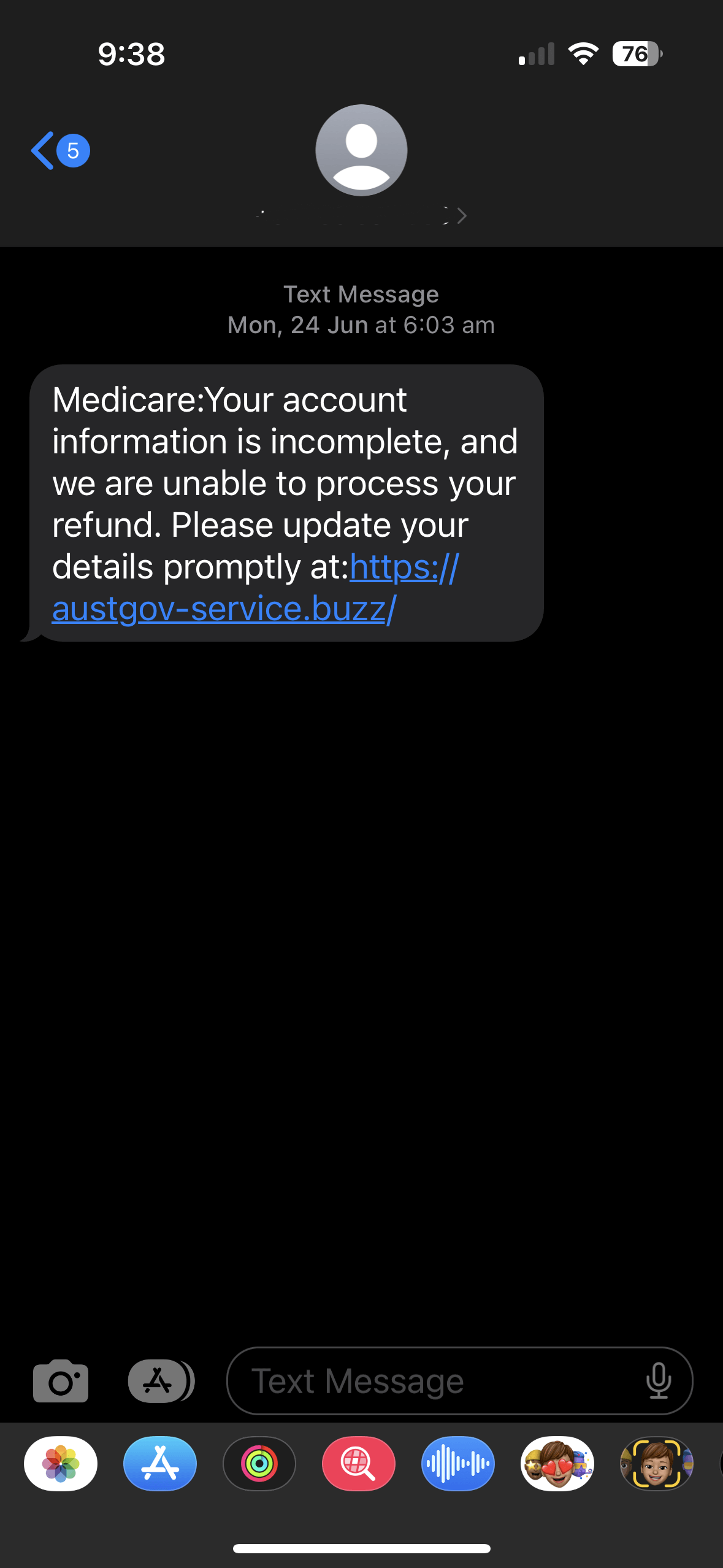
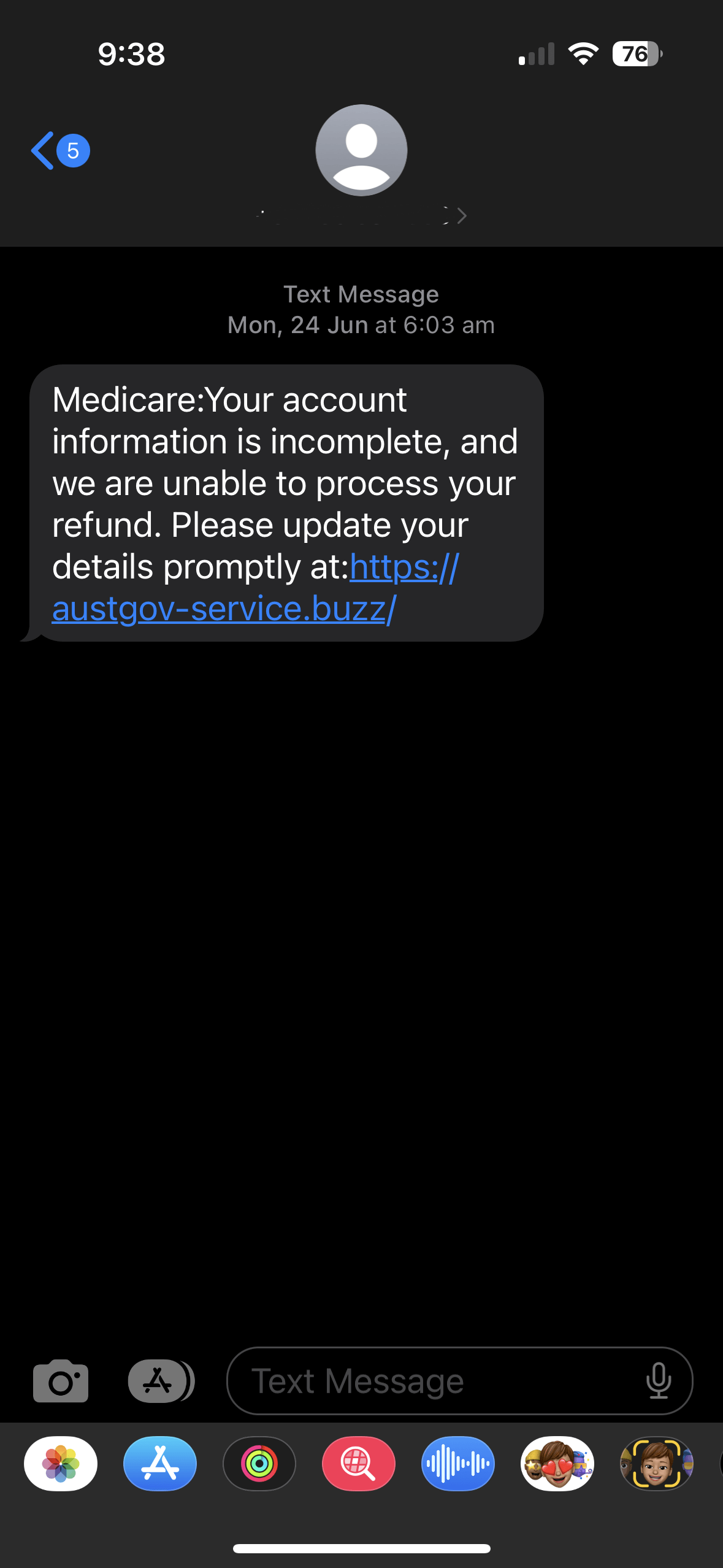
May 2024 – BOQ Impersonation Scam
We are seeing a re-emergence of customers receiving phone calls from scammers posing as representatives of the bank. These calls will often come unexpectedly with scammers claiming to be employees of Bank of Queensland or other financial institutions you may have legitimate banking with.
The intent of these calls is to gain access to your personal information, which scammers will then use to attempt to access your funds. Often, these scammers present as personable and knowledgeable, and may use the following tactics to “verify themselves” as bank employees:
- Provide ‘employee numbers’ or full names
- Transfer you to a ‘supervisor’ or ‘team leader’
- Recite your personal details (which may be known from a third-party data breach or a past phishing incident)
We understand it can be difficult to identify scam calls, so it is important to know what to look out for. During these calls, scammers are generally seeking to obtain:
- Personal information including full legal name, DOB, address and phone number
- Copies of identification documentation (e.g. Driver’s License, passport, Medicare credentials)
- Internet Banking credentials, Visa Debit Card details, one-time verification codes
It is important to remain vigilant and conduct your own validations prior to engaging with any party claiming to be a representative of BOQ or any other financial institution.
Unfortunately, these scam calls are prevalent and have the potential to cause substantial compromise and loss to customers. This is namely achieved by disclosing personal information and ID documents, enabling third-party access to personal devices through remote access, clicking third-party links, and/or completing payments requested by scammers.
How to protect yourself:
- If you receive an unsolicited call from someone claiming to be from BOQ – terminate the interaction and call the BOQ Customer Contact Centre on 1300 557 272 to verify whether the contact was genuine.
- Do not provide any personal or sensitive information over the phone, especially during an unsolicited call.
- Do not click on any third-party links or accept requests to download applications or programs to your personal devices.
- Do not accept requests to provide one-time verification codes.
April 2024 – Deepfake AI Scams
BOQ have been alerted to an emerging scam type which utilises artificial intelligence (AI) through deepfakes. Deepfakes are categorised as lifelike impersonations of real people created by AI. Deepfakes are capable of closely imitating one’s likeness and in some cases, can mimic a person’s voice and body language. Unfortunately, scammers are using AI to create fake news articles and videos impersonating well-known individuals (e.g. Hugh Jackman, Gina Rinehart, Elon Musk) and businesses to attract customers to ‘take advantage’ of fake investment opportunities.
These articles or videos will typically show the public figure in an interview-style setting speaking about fake trading platforms and may show them using the fake platform to feign credibility. The platforms may claim to use AI and other technologies that can create high profit margins for those willing to invest. While these scams typically begin with a request for a small fee to access the platform, over time they have the propensity to generate significant financial loss.
It is important to always be on alert for potential scams online. Here is what to look out for with deepfake AI scams:
- Videos or articles of public figures promoting trading companies or investment platforms
- Most celebrities and public figures will not use or have the need to use investment platforms. It is important to always do your own due diligence and research into investment companies prior to investing.
- Refrain from clicking any links or contacting provided details attached to these articles/videos
- These scams use third-party links which can lead you to fake investment platforms where your personal details can be compromised. Never click third-party links or provide card/account information.
- Avoid any investment opportunities that seem ‘too good to miss out on'
- Perpetrators use ‘high return’ as a strategy to lure individuals into using their platform over other trading platforms. Safety is key, unfortunately ‘higher’ is not always better!
When investing, it is important to remain vigilant and seek independent financial advice prior to proceeding. Due to the high volume of scams in this area, it is crucial to conduct your due diligence and research.
If you have any concerns about the legitimacy of an investment opportunity or trading platform, you can contact us directly (either via fraudandscamoperations@boq.com.au or using the details on our https://www.boq.com.au/contact-us page).
March 2024 – BOQ Term Deposit Scam
The Bank has been made aware of a BOQ branded Term Deposit scam which has adopted the name of a genuine BOQ employee to impersonate for this scam.
Customers have reported to being contacted by someone claiming to be a Private Wealth Manger at 111 St. Gorges Terrace WA 6000. Customers have reported that they were contacted via phone and email to discuss the opportunity and received brochures offering BOQ Term Deposits with unusually high interest rates of up to 7.30% per annum.
Investors may be targeted whilst browsing the internet looking for a good rate, or from completing enquiry forms, via some third-party or comparison sites.
The imposter reportedly initiates and maintains contact via phone and email. During this time, they may provide seemingly official documentation and forms with application documents, maturity dates, and terms and conditions surrounding possible investment options.
What to look out for:
- Unrealistically high returns or bonds which seem ‘too good to be true’.
- Consistent pressure to invest due to the ‘risk of missing out’.
- Professional looking forms or prospectuses with either:
- ‘lookalike’ email addresses (e.g. @queenslandtermdeposits.com)
- non-genuine phone numbers (e.g. +61 8 6119 8130)
- Unusual requests for personal information and extensive ID documents.
- Being asked to pay funds directly into a bank account with BSB’s not belonging to BOQ.
If you have any concerns about the legitimacy of correspondence, please seek independent financial advice or contact us directly (either via fraudandscamoperations@boq.com.au or using the details on our https://www.boq.com.au/contact-us page).
Helpful Links and Resources:
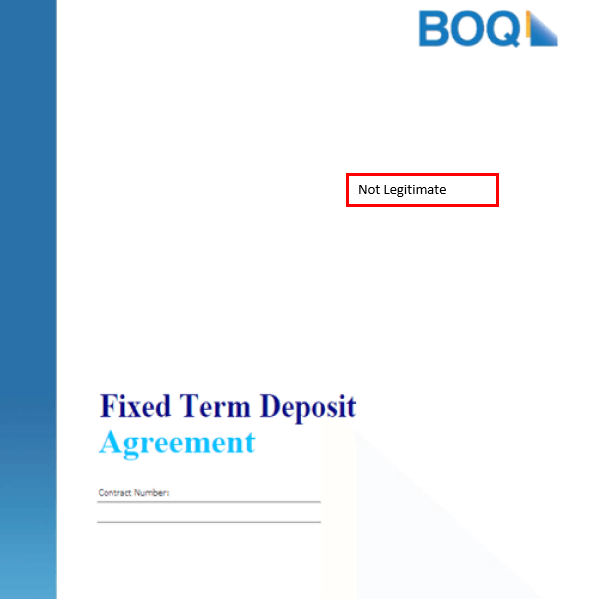
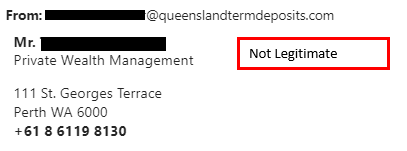
February 2024 - B.Q.L Management Pty Ltd Scam
We are aware of a new B.Q.L Management Pty Ltd branded imposter term deposit and bonds scam. Scammers are claiming to be selling Bond and Term Deposits via a scam wesbite "www.bql-management.com".
The imposter reportedly initiates and maintains contact via phone and email. During this time they may provide seemingly official documentation and forms with application documents, maturity dates, and terms and conditions surrounding possible investment options.
What to look out for:
- Unrealistically high returns or bonds which seem ‘too good to be true’.
- Any mention of a ‘guaranteed fixed income’ or ‘no exposure’.
- Consistent pressure to invest due to the ‘risk of missing out’.
- Professional looking forms or prospectuses with either:
- ‘lookalike’ email addresses (e.g., info@email-bql.com)
- non-genuine phone numbers (e.g., (07) 4802 5376)
- formatting inconsistencies
- Unusual requests for personal information or copies of identity documentation (e.g., Driver’s Licence or Passport).
- Being asked to deposit funds directly into a bank account.
If you have any concerns about the legitimacy of correspondence, please seek independent financial advice or contact us directly (either via fraudandscamoperations@boq.com.au or using the details on our https://www.boq.com.au/contact-us page).
Helpful Links and Resources:
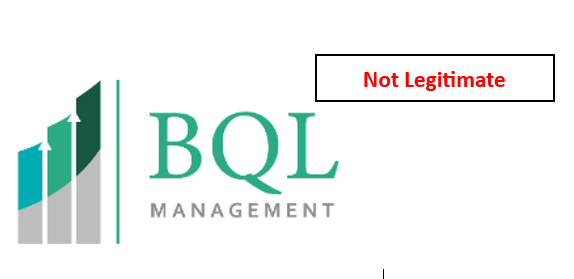
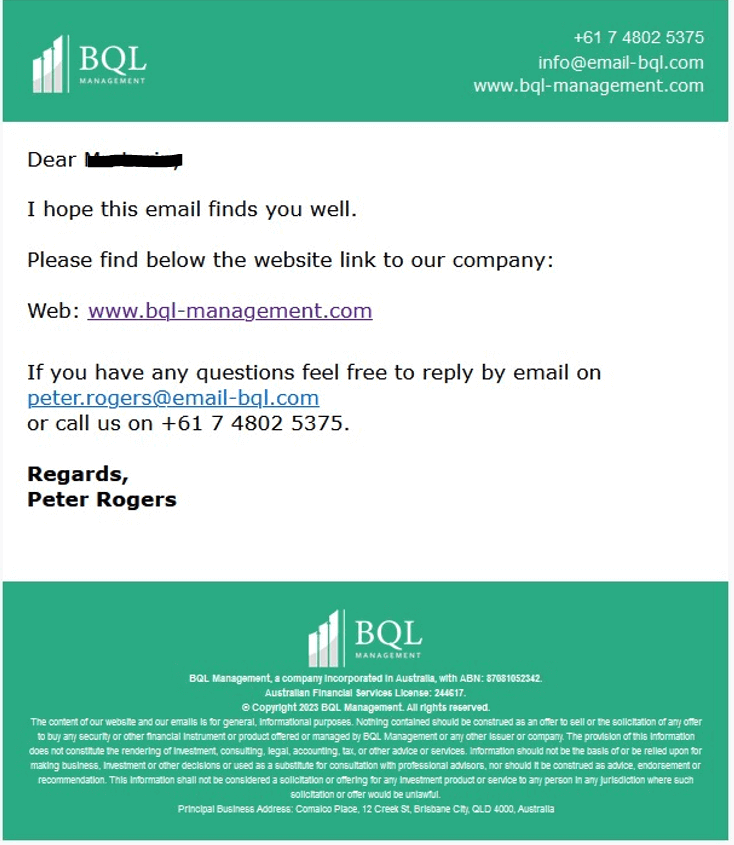
January 2024 - Investment Scam Warning
BOQ is aware of a high volume of investment scams currently circulating in Australia and targeting our customers. Investment scams are schemes that promise high returns or low risks but are designed to take your money and run. They often use fake websites, documents, and testimonials to lure you in and make you believe they are legitimate.
It is important to know that any business who provides a cryptocurrency exchange in Australia must be registered with AUSTRAC. One example of a currency exchange which has had their registration with AUSTRAC suspended is Bluestar Exchange Pty Ltd, a company that claims to offer foreign exchange trading services (current at 17/11/2023). AUSTRAC have issued warnings about unregistered digital currency exchanges and advised investors should avoid dealing with them. If you have invested with an unregistered exchange, you should contact BOQ immediately.
To avoid falling victim to investment scams, you should always do your own research and check the credentials of any company or person you are dealing with. Here are some warning signs to look out for:
The offer sounds too good to be true, such as guaranteed or unrealistic returns, low or no fees, or exclusive access to a secret or insider deal.
- The offer sounds too good to be true, such as guaranteed or unrealistic returns, low or no fees, or exclusive access to a secret or insider deal.
- The offer is urgent or pressure-filled, meaning you are asked to act quickly or miss out on a limited opportunity, or you are not given enough time or information to make an informed decision.
- The offer is complex or confusing, meaning you are not given clear or consistent details about how the investment works, what the risks are, or how you can get your money back.
- The offer is unregulated or unregistered, meaning the company or person is not licensed or authorised by AUSTRAC, ASIC or any other reputable regulator, or the investment product is not registered or disclosed on any official platform.
If you suspect that you have encountered an investment scam, you should take the following steps:
- Do not respond to or engage with the scammer, and do not provide any personal or financial information.
- Stop any payments or transfers you have made or are about to make and contact your bank or financial institution as soon as possible.
- Report the scam to ASIC, the ACCC, AUSTRAC or Scamwatch, and provide as much evidence as you can.
- Seek professional advice from a licensed financial planner or counsellor if you need help with your financial situation or recovery.
At BOQ, we care about your financial security and well-being. We are committed to helping you protect yourself from fraud and scams. If you have any questions or concerns, please contact us on 1300 55 72 72 or visit our website for more information and tips.
November 2023 – Online Shopping Scams
We're approaching the busiest time of year for online shopping with Black Friday, Cyber Monday and Boxing Day sales almost here. We're warning customers to to be alert to scam websites or text messages when shopping online for bargains.
Shopping scams remain a significant threat, exposing individuals and businesses to risks through fake product listings, deceptive payment requests, and insecure payment avenues.
Your financial security is our top priority, Identifying the collection of personally identifiable information, especially card details during this season, heightens the risk, leaving individuals and businesses vulnerable to data-hungry cybercriminals.
What to look out for:
- Requests for payments via bank transfer or virtual currencies.
- Links in emails soliciting bank details or other sensitive information.
- Requests to charge an application or priotity fee or for multiple forms of personal identification including your bank details.
- Emails and messages regarding undelivered items or fees required for a 'failed' delivery.
- Inadequate information on privacy, conditions of use, dispute resolution, or contact details.
Shopping online securely:
- Safeguard payment information and accounts; refrain from saving payment details on online shopping accounts.
- Trust reputable sellers.
- Be aware of warning signs.
- Be aware of advertisements on social media - always google the company and validate the sale on their website.
If you receive suspicious emails or messages, refrain from clicking any links or providing card details. Exercise caution with online shopping deals; if it seems too good to be true, it probably is!
If in doubt, contact BOQ:
- To report a fraud or scam, attend your local branch or call us immediately on 1300 55 72 72 (Monday-Friday, 8am-8pm AEDT, and Saturday 9am-5pm AEDT).
- Report a cybercrime or cyber security incident to the ACSC via ReportCyber at www.cyber.gov.au/report, or call the Australian Cyber Security Hotline on 1300 CYBER! (1300 292 371).
September 2023 – BOQ Impersonation Scam
BOQ are aware of a new fraud trend where customers are receiving phone calls from UK based third parties claiming to be representatives of the bank.
During these calls, scammers will pose as employees from Bank of Queensland and attempt to gain a large amount of personal information from you, often including full legal name, Internet Banking log in information, Visa card numbers, date of birth and one-time verification codes.
Using this information gained from you, the scammers will then use a number of techniques to gain access to your funds.
The scammers may attempt to:
- Complete fraudulent charges on your card by adding your card number to their digital wallet
- Pose to be you in order to make changes to your banking profile including increasing daily limits, resetting your Internet Banking password or changing your contact details
- Log in to your Internet Banking profile to access your funds
What to look out for:
- Unsolicited calls, emails or text messages claiming to be from BOQ (remember scammers can mask what number they are contacting you from and whilst it may appear to be genuinely from BOQ it could still be fraudulent)
- Requests for sensitive information from someone claiming to be BOQ
- Urgent or threatening language
- Communication with grammar or spelling errors
How to protect yourself:
- If you receive an unexpected call from someone claiming to be BOQ or another authority, hang up the call immediately and call the organisation back via a trusted phone number.
- Never disclose personal information and card numbers or other banking information on an unsolicited phone call.
- If you receive any suspicious correspondence, stop and call BOQ immediately to confirm if it is genuine.
If in doubt, contact BOQ:
- To report a fraud or scam, attend your local branch or call us immediately on 1300 55 72 72 (Monday-Friday, 8am-8pm AEDT, and Saturday 9am-5pm AEDT).
- Report a cybercrime or cyber security incident to the ACSC via ReportCyber at www.cyber.gov.au/report, or call the Australian Cyber Security Hotline on 1300 CYBER! (1300 292 371).
June 2023 – Tax Scams
In the lead up to End of Financial Year and tax return time, it’s time to be alert to the behaviour of scammers and to remain vigilant with personal information.
There are several tactics scammers use at this time of year in attempt to gain access to personal and/or account information. The most common technique is via an impersonation scam, where the scammer poses as the ATO, your bank or other trustworthy organisations.
Techniques scammers are using include:
- Scammers are posing as the ATO on social media offering help and advice on issues relating to tax and superannuation, to disguise what is actually an attempt to trick you into providing your information. The ATO will never ask for personal information via social media, email or SMS.
- Correspondence is circulating from scammers that tell you that you are entitled to a refund owing from the ATO. Like the above this is a disguise to trick you into providing personal information via the return forms.
- Scammers may also contact you to tell you that you have a tax debt that needs to be paid immediately. This may come with threats of arrest if payment is not made or ask for unusual payment methods such as gift card payments or payments made to personal bank accounts.
What to look out for:
- Unsolicited calls, emails or text messages from trusted sources such as the ATO, your super fund or your bank
- Communication via unofficial email addresses or phone numbers not related to the organisation.
- Communication with grammar or spelling errors
- Urgent or threatening language
- Emails with blurry or low-quality logos
- Unusual requests for sensitive information
How to protect yourself:
- Delete any suspicious correspondence from your account or block the account on social media.
- Never send personal information via social media, email or SMS.
- Never click on or log onto your government accounts via links in emails or text messages. Instead use logins provided on legitimate webpages.
- If you receive any suspicious correspondence stop and call 1800 008 540 to check if it was the ATO speaking with you.
If in doubt, contact BOQ:
To report a fraud or scam, attend your local branch or call us immediately on 1300 55 72 72 (Monday-Friday, 8am-8pm AEDT, and Saturday 9am-5pm AEDT).
If you have any concerns about the legitimacy of correspondence, or individuals, contact the ATO directly using their genuine website and contact details (https://www.ato.gov.au/). Alternatively if you’re unsure you can contact BOQ group directly (either via fraudandscamoperations@boq.com.au or using the details on our Contact Us page).
Report a cybercrime or cyber security incident to the ACSC via ReportCyber at www.cyber.gov.au/report, or call the Australian Cyber Security Hotline on 1300 CYBER! (1300 292 371).
For more tips and resources, visit: https://www.boq.com.au/help-and-support/fraud-and-scams
May 2023 - BOQ Term Deposit Scam
We have been made aware of a BOQ branded imposter term deposit scam, similar to a VMA branded imposter bond scam in January 2023. Scammers are attempting to adopt the identities of legitimate BOQ Group employees and are claiming to be selling Bond and Term Deposits of 4% - 6% with a minimum investment of $25,000.00.
Investors may be targeted whilst browsing the internet looking for a good rate, or from completing enquiry forms, via some third-party or comparison sites.
The imposter reportedly initiates and maintains contact via phone and email. During this time they may provide seemingly official documentation and forms with application documents, maturity dates, and terms and conditions surrounding possible investment options.
Offers for investment may appear branded across any of the BOQ Group brands including ME Bank, VMA, BOQ and MyBOQ.
What to look out for:
- Unrealistically high returns or bonds which seem ‘too good to be true’.
- Any mention of a ‘guaranteed fixed income’ or ‘no exposure’.
- Consistent pressure to invest due to the ‘risk of missing out’.
- Professional looking forms or prospectuses with either:
- ‘lookalike’ email addresses (e.g., name@boq-im.com, info@boq-applications.com)
- non-genuine phone numbers (e.g., (02) 9071 7190, 02 9191 7412)
- formatting inconsistencies
- Unusual requests for personal information or copies of identity documentation (e.g., Driver’s Licence or Passport).
- Being asked to deposit funds directly into a bank account.
If you have any concerns about the legitimacy of correspondence, please seek independent financial advice or contact us directly (either via fraudandscamoperations@boq.com.au or using the details on our https://www.boq.com.au/contact-us page).
Helpful Links and Resources:
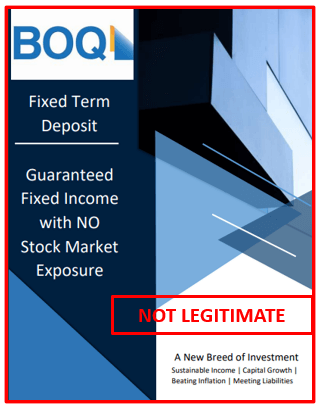
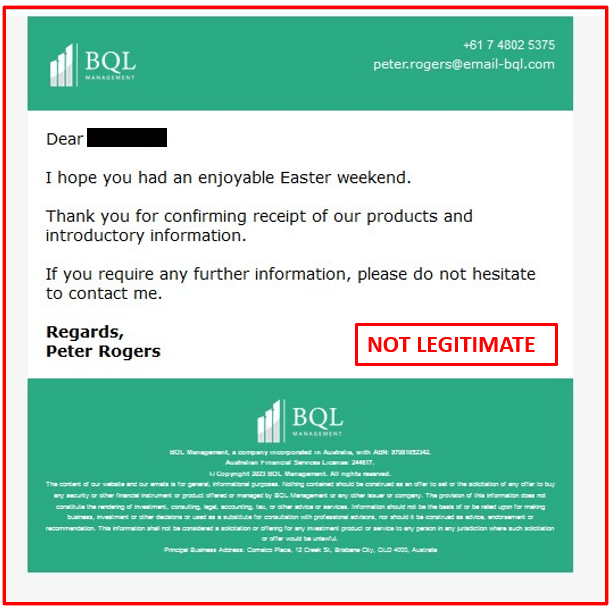
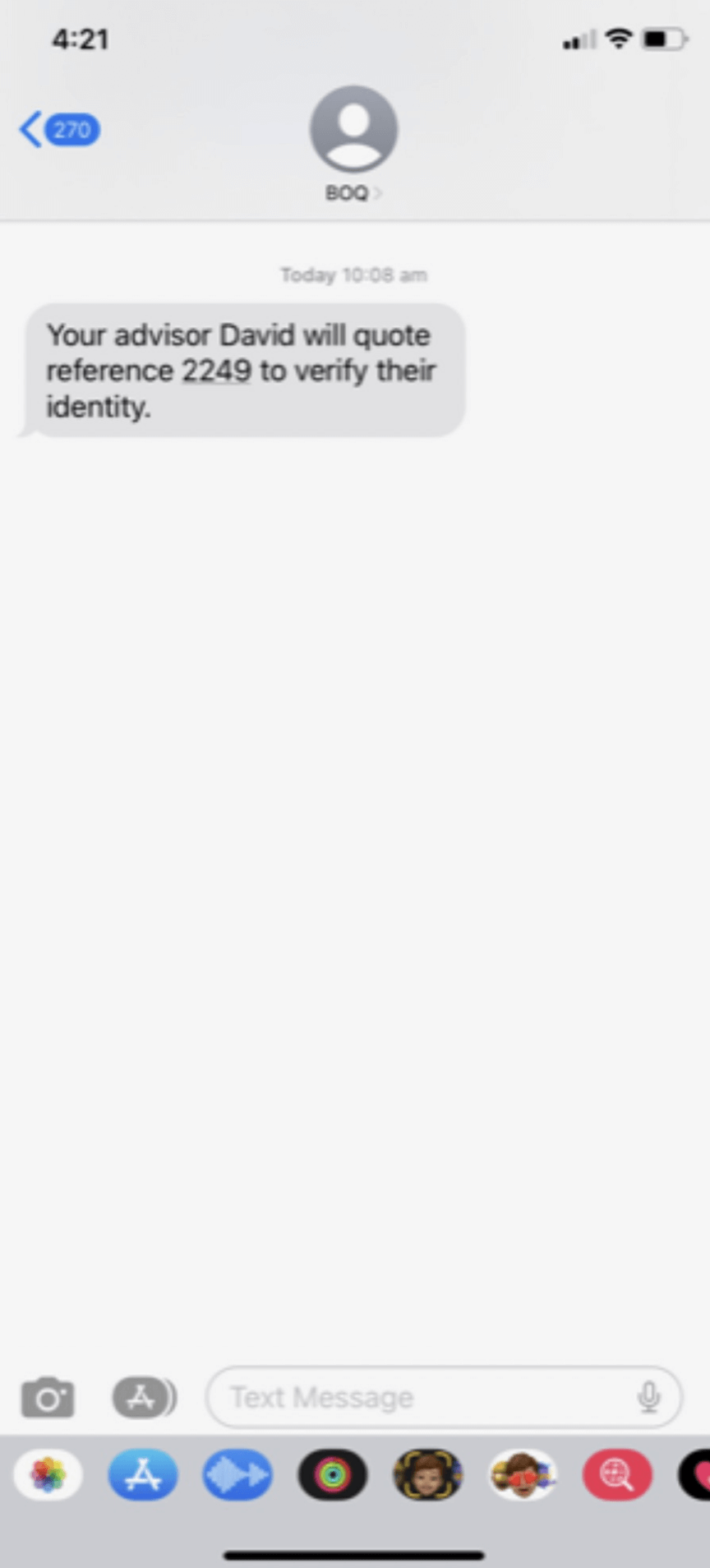
April 2023 - BOQ Group Impersonation and Phishing Messages
BOQ Group has been alerted to a new scam trend involving customers receiving text messages claiming to be from BOQ. These messages are appearing in the same chain as previous legitimate BOQ correspondence and may include spoofed links and names to appear legitimate. The message advises you that you will receive a phone call from BOQ staff regarding security concerns on the account. An authentication code is also included in the text message to quote to the caller.
Customers are then receiving a follow-up phone call from a third party posing to be from BOQ. The callers may then advise you that that your funds are not safe, and that they need to be transferred out of the your account to a “safe” account.
The caller may ask you to download remote access software onto your computer or mobile device and log into your Internet Banking.
What to look out for:
- Urgency is emphasised so that the scammers can pressure you to provide your details or convinve you to do something quickly.
- The text message or caller may allude to a security compromise with your account but may struggle to provide any specific information.
- Callers informing you that your funds are not safe.
- Callers asking for personal information or to transfer money over the phone.
How to protect yourself:
- If you receive an unexpected call or SMS, you should never click any links or provide any personal information.
- Always use the trusted applications and website to login to banking platforms.
- Never provide remote access to your device or PC.
- If directed to call your bank, always contact BOQ via a phone number or other details on our Contact Us page.
- If you think your account details or card details have been disclosed to a scammer, or if you receive a verification code that you didn't request, immediately contact BOQ on 1300 55 72 72 or you can also let us know by emailing fraudandscamoperations@boq.com.au or by visiting your nearest branch.
March 2023 - Undercover Police/ Cash Withdrawal Scam
BOQ are aware that a higher influx of calls to customers requesting cash withdrawals where the callers are pretending to be representatives of the Undercover Police. The callers are targeting the elderly and vulnerable, claiming that the police are working on an operation to stop a hacker inside of BOQ from stealing your money. They introduce themselves with an alias, badge/staff number and fake reference number.
The caller claims that no money will be lost as it will be re-deposited later, whilst another party pretends to be a staff member to gain your personal details including address. These callers coach you into withdrawing cash from a BOQ branch, and provide a cover story (e.g., travelling overseas, work done on the house, and terminal illness related bills).
The scammers create layers of information, fabricate scenarios and individuals to create the illusion of a sophisticated sting operation. The secret nature of the operation is reinforced by convincing you to not tell friends, family or even the Bank.
After acquiring the cash, the scammers visit your address with a duffle bag to collect the cash and then disappear.
What to look out for:
- Unsolicited and unexpected phone calls from individuals claiming to be ‘undercover police’,
- Urgency and pressure to comply with the callers demands,
- Trusted organisations like the police will never ask for payment or for members of the public to assist in police operations. Take note of the name and badge number of the officer and contact your local police station to let them know.
How to protect yourself:
- Do not disclose personal information in an unsolicited or unexpected phone call,
- Never send or give money to someone you haven’t met in person,
- End the phone call if the caller is threatening or forcing you to do something (like withdraw cash),
- If you’re felling unsure, speak to a trusted family member, friend or your bank.
BOQ urge the community to remain aware and vigilant to these types of scams. If you do receive a request similar to this, contact the police and your bank immediately.
If in doubt, contact BOQ:
To report a fraud or scam, attend your local branch or call us immediately on 1300 55 72 72 (Monday-Friday, 8am-8pm AEDT, and Saturday 9am-5pm AEDT).
If you have any concerns about the legitimacy of correspondence, or individuals, contact us directly (either via fraudandscamoperations@boq.com.au or using the details on our Contact Us page).
Report a cybercrime or cyber security incident to the ACSC via ReportCyber at www.cyber.gov.au/report, or call the Australian Cyber Security Hotline on 1300 CYBER! (1300 292 371).
For more tips and resources, visit: https://www.boq.com.au/help-and-support/fraud-and-scams
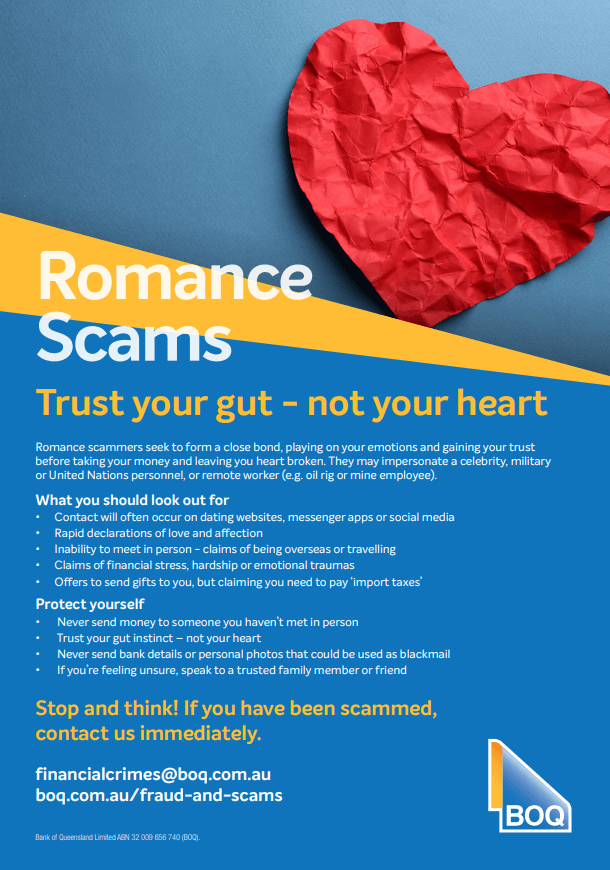
February 2023 - Valentine's Day Romance Scams
In the lead up to Valentine's Day, scammers cyber crims, and fraudsters are actively targeting those looking for love and companionship.
Romance Scams are particularly prominent around this time of year and can cause serious harm, financial and emotional distress. Emotional manipulation techniques and crafted vulnerability sadly sees more and more people continue to fall victim to these types of scams.
In some cases, the scammers may pretend to be:
- A member of the United Nations deployed in a remote warzone,
- A famous celebrity,
- Working on an oil ring and unable to access a bank.
Keep a look out for scammers who:
- Profess strong feelings after only a short time or few contacts,
- Bombard you with messages or texts,
- Have inconsistent information or images on their social media or other accounts,
- Who are hesitant or always come up with reasons not to meet in person or to talk via voice or video,
- Providing elaborate reasons why they require gifts, gift cards, money, or to gain your personal information.
How to protect yourself:
- Never send personal information such as bank details or personal photos that could be used as blackmail,
- Never send money to someone you haven’t met in person,
- If you're feeling unsure, speak to a trusted family member or friend,
- If they apply pressure to you, stop communicating.
Remember, if you see or experience a scam, report it.
To report a fraud or scam, attend your local branch or call us immediately on 1300 55 72 72, visit www.boq.com.au/contact-us for our operating hours.
For more information about scams, please visit our Fraud & Scams Assistance Page: https://www.boq.com.au/help-and-support/fraud-and-scams
Other helpful links and resources:
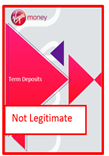
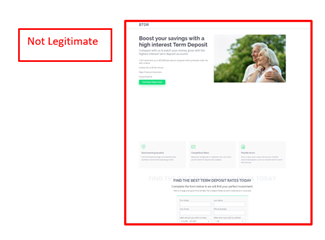
January 2023 - VMA Bond Term Deposit Scam
We have been made aware of a VMA branded imposter bond scam, similar to what ASIC reported in January. Scammers are attempting to adopt the identities of legitimate VMA employees and claiming, “to be selling Term Deposits of 3.75% - 6.25% with an investor deadline of 30th January 2023”.
Investors may be targeted from completing enquiry forms, via some third-party or comparison sites, or expressing an interest in investing online via BTDR (best-termdepositrates.com)
The imposter reportedly initiates and maintains contact with interested parties, sometimes over an extended period of time. During this time they may provide application instructions, maturity dates, investment thresholds, and other specific details surrounding possible investment options.
What to look out for
- Unrealistically high returns or bonds which seem ‘too good to be true’.
- Consistent pressure to invest due to the ‘risk of missing out’.
- Professional looking forms or prospectuses with either:
- ‘lookalike’ email addresses (e.g. enquiry@vm-onboarding.com )
- non-genuine phone numbers (e.g. 02 9099 1675, 02 9191 7412)
- Unusual requests for personal information.
- Being asked to pay funds directly into a bank account.
If you have any concerns about the legitimacy of correspondence, please seek independent financial advice or contact us directly (either via fraudandscamoperations@boq.com.au or using the details on our https://www.boq.com.au/contact-us page).

January 2023 - BOQ Group Impersonation Calls
BOQ Group has been alerted to a new scam involving calls to customers from Private Numbers and Landlines where the callers are advising that they work for the BOQ Group. The callers are targeting customers who may have previously fallen victim to a scam and are citing various reasons for the call, including:
- to discuss 'fraudulent transactions' on your account,
- to inform that your funds are at risk due to an internal breach,
- to say that your funds need to be moved to a float account due to maintenance.
A risk of further compromise or financial loss is highlighted unless you follow the caller's instructions. These calls can sometimes occur after clicking on fake third-party links in text messages, which then request your details in an online form. The caller may ask you for your personal information, Internet Banking information, Card Numbers or to verify a One Time PIN sent to you. The caller may also recite details including names, DOB and email addresses which you may have used to fill out online forms.
Numbers the calls are coming from include (but are not limited to):
- 03 9708 4001
- 03 9000 8776
- xx 9144 7800
What to look out for:
- Callers typically call from Private Numbers, Victorian or New South Wales Landlines
- Victims have reported that in some cases the caller had a British accent
- Urgency is emphasised so that the scammers can pressure you to provide your personal information quickly
- Callers may allude to a security compromise with either your card, accounts, or internet banking but may struggle to provide any specific information.
- Callers may seem knowledgeable and may recite personal details that you have recently entered into an online form.
- Receiving phone calls soon after clicking on a link or entering phone number into an online form.
- Multiple calls from the same number claiming to be from different organisations/ banks.
- Callers informing you that your funds are not safe.
- Callers requesting funds to be transferred out due to maintenance.
How to protect yourself:
- If you receive an unexpected call or SMS, you should never click the link in the message or provide personal/banking information. Contact the company directly using a verified phone number or trusted channel to confirm the request.
- You should never share or disclose verification codes with a third party.
- If you think your account details or card details have been disclosed to a scammer, or if you receive a verification code that you didn’t request, immediately contact:
- ME Bank on 13 15 63 or using the details on our Contact Us page on the ME bank website - https://www.mebank.com.au/home/contact-us/.
- BOQ on 1300 55 72 72 or you can also let us know by emailing fraudandscamoperations@boq.com.au or by visiting your nearest branch.
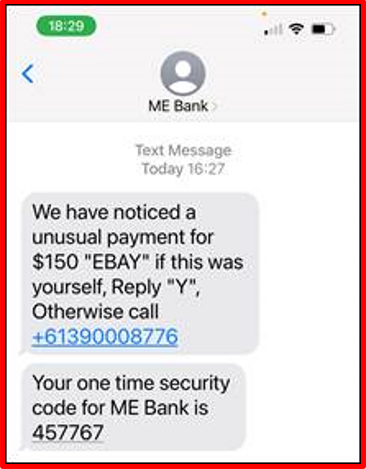
December 2022 - ME Bank Phishing Text Message
BOQ Group has been alerted to several phishing text messages that notify you that ME Bank has noticed an unusual payment from your account. The text message requests you to call +61390008776 if the transaction is not recognised and it appears to come from the ME bank user ID. The phone number provided takes you through to a scammer, who may ask you for your personal information, or to verify a One Time PIN sent to your mobile.
What to look out for and how to protect yourself:
- If you receive an unexpected call or SMS requesting payment, you should never click the link in the message or provide card/account information. Contact the company directly using a verified phone number or trusted channel to confirm the request.
- You should never share or disclose verification codes with a third party.
- If you think your account details or card details have been disclosed to a scammer, or if you receive a verification code that you didn’t request, contact ME Bank immediately on 13 15 63 or using the details on our Contact Us page on the ME bank website - https://www.mebank.com.au/home/contact-us/.

November 2022 - Online Shopping and Data Security
The busiest time of the year is approaching for online shopping, with enticing deals linked to Black Friday, Cyber Monday and the festive season already appearing in our inboxes and in the media.
Online shopping scams continue to be one of the most common threats to Australians. These scams carry significant risks, exposing individuals and businesses through fake product listings and payment requests, and non-secure payment avenues.
The increasing storage of personally identifiable information, including card details on sites visited at this time of year, continues to elevate the risk by exposing individuals and businesses to data hungry cybercriminals.
Once a cybercriminal has your bank details from one of these scams, not only will you be disappointed that your goods never arrived, but also that your identity and bank information has been stolen.
What to look out for:
- Requests for payments via bank transfer or virtual currencies.
- Links in emails asking for bank details or other information.
- Emails and messages about items yet to be delivered or where a fee is required to release a ‘failed’ delivery.
- Inadequate information about privacy, conditions of use, dispute resolution or contact details.
How to shop online securely:
- Use secure devices, avoid public wi-fi networks.
- Protect your payment information and accounts, avoid saving your payment details to online shopping accounts.
- Use trusted sellers.
- Know the warning signs.
If you receive any suspicious emails or messages, do not click any links or provide your card details. Be wary of online shopping deals and discounts, if it looks too good to be true, then it probably is.
If in doubt, contact BOQ:
If you have any concerns about the legitimacy of correspondence, contact us directly (either via financialcrimes@boq.com.au or using the details on our Contact Us page).
Report a cybercrime or cyber security incident to the ACSC via ReportCyber at www.cyber.gov.au/report, or call the Australian Cyber Security Hotline on 1300 CYBER1 (1300 292 371)
For more tips and resources, visit: https://www.boq.com.au/help-and-support/fraud-and-scams
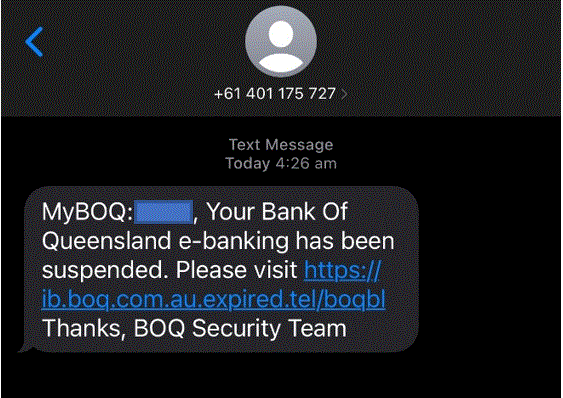
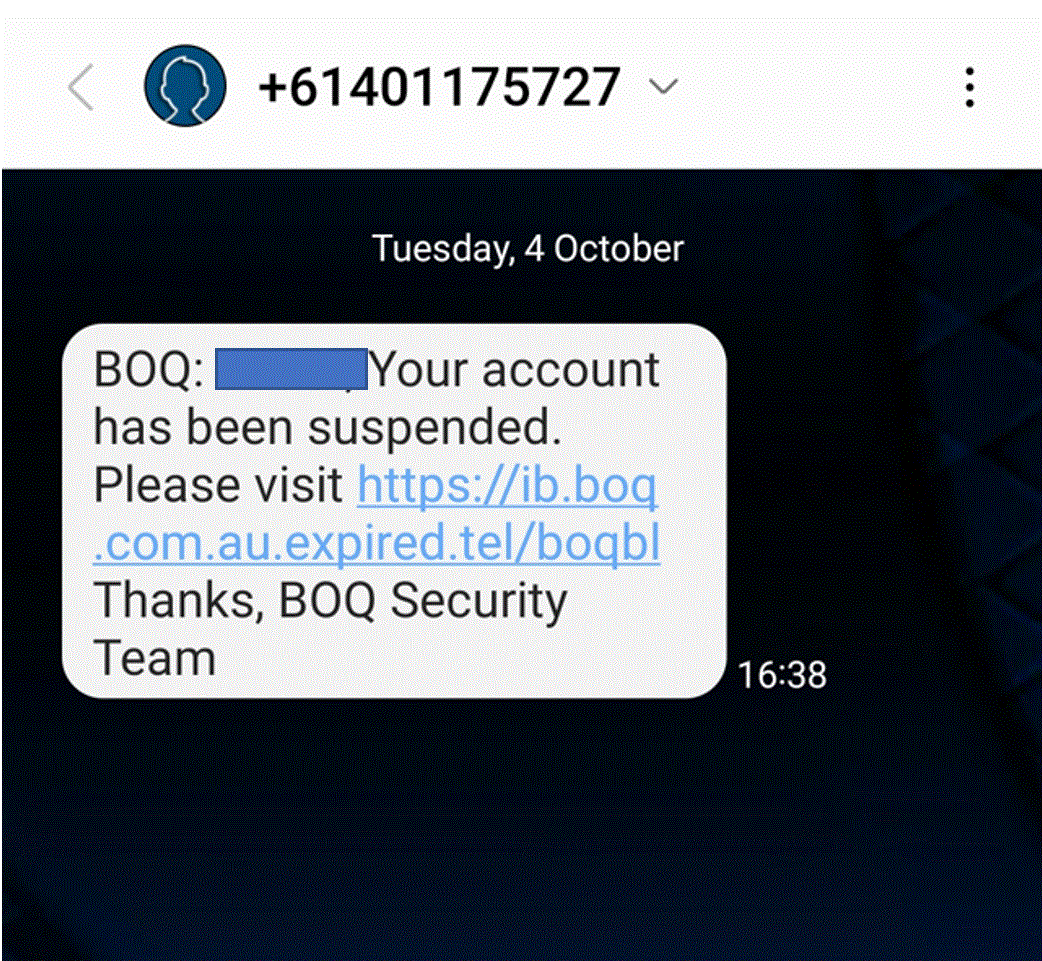
October 2022 - BOQ Phishing Text Message
BOQ has been alerted to several phishing text messages that notify you that your BOQ or myBOQ e-banking or account has been restricted. The text message contains a hyperlink that takes you to a fake BOQ Internet Banking log-in page and may also be addressed to you.
The phishing website asks for your Customer Access Number (CAN) and password.
If you receive such a text message, do not click any links and do not provide your CAN or password. BOQ will never provide you with a link to log into your Internet Banking. Only access Internet Banking by typing www.boq.com.au into your internet browser.
Numbers the text messages are coming from include (but are not limited to):
- 0401 175 727
The URLs included may be one of the following:
- https://boqservicers.cc
- https://ib.boq.com.au.outd.info/boqbl/
- https://ib.boq.com.au.expired.tel/boqbl
- https://ib.boq.com.au.mobiupdate.info/boqbl
- https://itly/boqdevice
- https://bit/boqdevice
- https://bit.ly/3yco4Xx
If in doubt, contact BOQ:
- via email at Financialcrimes@boq.com.au
- by visiting your local branch
- on 1300 55 72 72, visit www.boq.com.au/contact-us for our operating hours.
For more tips and resources, visit: https://www.boq.com.au/help-and-support/fraud-and-scams
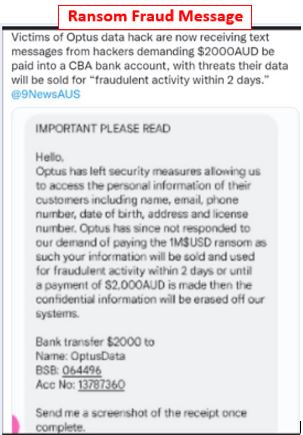
September 2022 - Online Security
Scams and fraud can happen to anyone. That’s why BOQ’s Fraud & Scams Operations Team monitors customer accounts for any suspicious activity including consideration of events such as the recent Optus data breach.
For more information regarding the Optus data breach and what this may mean for you, visit:
https://www.idcare.org/optus-db-response
To take extra steps to keep yourself and your loved ones safe from scams, here are some handy tips:
👉Don’t click on links within unsolicited text messages, emails or social media messages. Go to directly the app or website by entering the correct details yourself
👉When it comes to unknown phone calls, check the number and call the organisation directly using their legitimate details
👉Update your passwords, using a strong password not used for other accounts. Add two-factor authentication (2FA) to internet banking and personal accounts
👉Monitor your transactions regularly, consider using PayID and review the payment transfer limits on your accounts
👉If your identity has been compromised, contact us. You can also explore more via reputable sources such as scamwatch.gov.au, cyber.gov.au and idcare.org.
To report a fraud or scam, call us immediately on 1300 55 72 72, visit www.boq.com.au/contact-us for our operating hours. You can also let us know by emailing financialcrimes@boq.com.au or by visiting your nearest branch.
For more tips and resources, visit: https://www.boq.com.au/help-and-support/fraud-and-scams
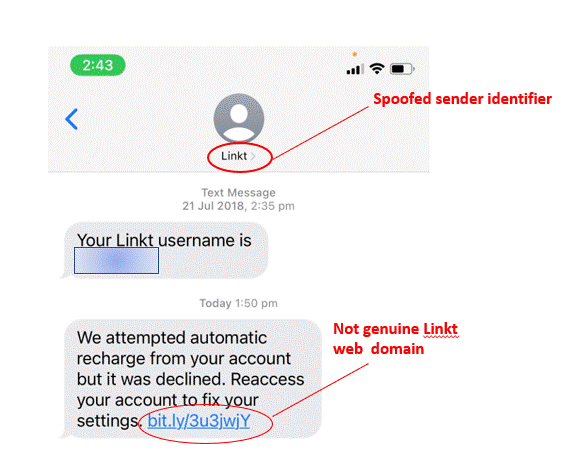
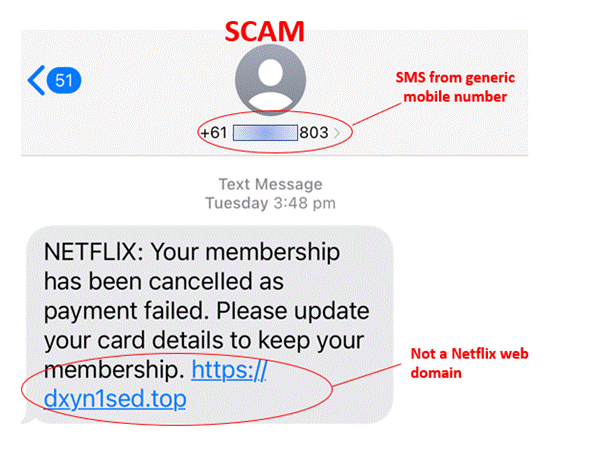
September 2022 - Digital Wallet Phishing Scams
Individuals have reported receiving a message via SMS using the brand of well-known companies such as Netflix and Linkt to target customers and gain their personal information and card details by saying that your payment information needs to be updated, you have unpaid tolls or your account has been suspended due to a payment failing.
The SMS contains a link to a legitimate looking website and prompts you to enter your card information. These details are being used to register the card information to a digital wallet on the mobile device of the scammer.
To complete the Digital Wallet registration, a verification code is sent via SMS and when this code is obtained the scammer, they can successfully register the victim’s card to their own Digital Wallet and make purchases.
What to look out for and how to protect yourself:
- If you receive an unexpected call or SMS requesting payment, you should never click the link in the message or provide card/account information. Contact the company directly using a verified phone number or trusted channel to confirm the request.
- You should never share or disclose verification codes with a third party.
- If you think your account details or card details have been disclosed to a scammer, or if you receive a verification code that you didn’t request, contact BOQ immediately at financialcrimes@boq.com.au or using the details on our Contact Us page.
For more information about scams, please visit our Fraud & Scams Assistance Page.
https://www.boq.com.au/help-and-support/fraud-and-scams
Other helpful links and resources:
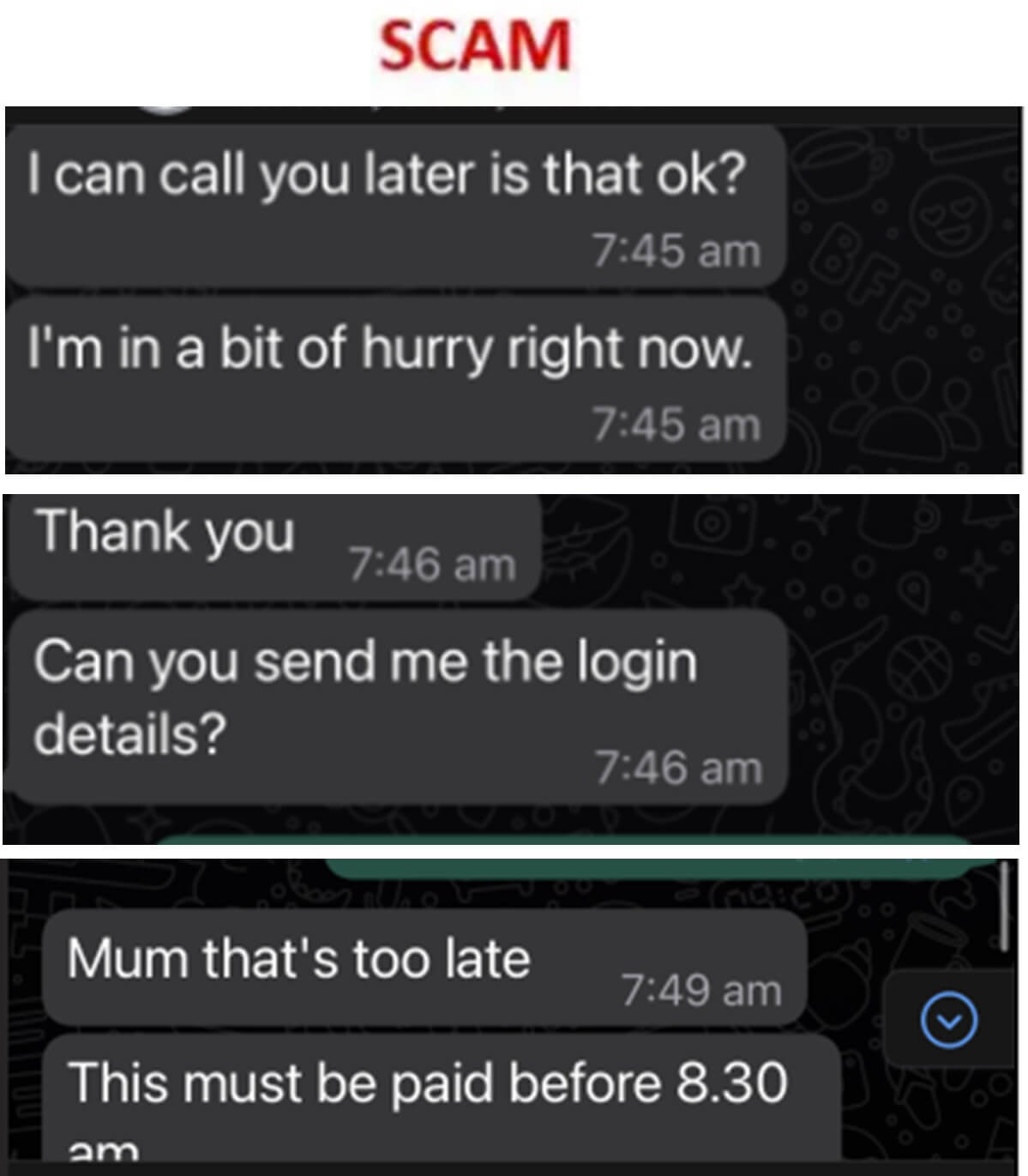
August 2022 - Family Impersonation Scam via WhatsApp, Text-Message and Social Media
BOQ continue to see an increase in reports where victims are being contacted by individuals claiming to be a family member requesting financial assistance to help pay invoices, outstanding bills or to repay debts.
These requests are being received via a range of popular messaging services where the sender advises they have recently changed phone numbers and to request you to delete and block their old number.
Once this has been completed, they will request you to provide or lend funds or even hand over login credentials to your Internet Banking.
In a recent publication from the Australian Communications and Media Authority (amca.gov.au)
"These messages often begin with a "Hi Mum" and could provide several different reasons why they are using a different phone number including switching providers or having a lost or broken phone"
https://www.acma.gov.au/articles/2022-08/consumer-warning-lost-phonenew-number-scams
BOQ urge the community to remain aware and vigilent to the increase in these types of scams and if you do receive a request similar to this, to contact that family member via a trusted channel to validate the request.
If you have any concerns about the legitimacy of any correspondence, contact us directly (either via financialcrimes@boq.com.au or using the details on our Contact Us page).
If you think you have paid money to a scammer, contact your bank immediately.
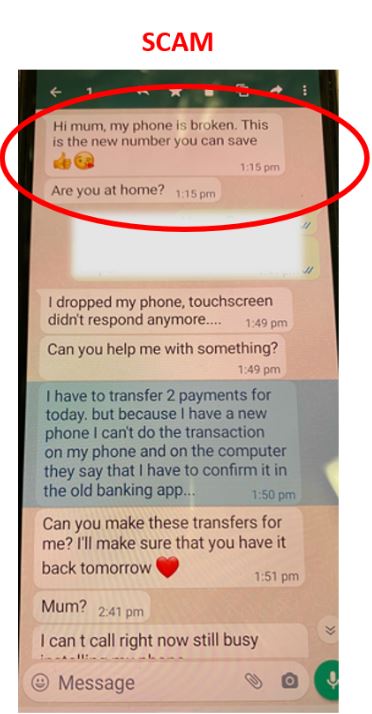
June 2022 - WhatsApp Impersonating Family or Children Scam
A scam trend has emerged where you may be contacted via Whatsapp, SMS or other Social Media from individuals claiming to be family or children who are in urgent need of money (Ref: 2022, June 01. Yahoo!News).
Victims have reported receiving messages stating, ‘Hi Mum’ or ‘Hi Dad’, the scammer then claims that their phone has been lost, stolen or damaged and the number they are contacting them on is their new contact number, and request their victim to save the new number.
The scammer, purporting to be a family member, may claim that they are in trouble with an authoritative figure such as the police, or that they have urgent payments or bills which they are unable to pay due to their phone being lost or broken. The scammer urgently requests the victim to make the payment on their behalf as soon as possible and that they will return the money promptly.
What to look out for and how to protect yourself:
- Be cautious of all approaches you did not initiate, especially if you are asked to send money online.
- Messages requesting money may become more desperate, persistent, or direct. If you do send money, they continue to ask you to send more.
- Do not respond to the contact unless you are 100% sure if they are genuine.
- Confirm the identity of the contact by calling the supposed family member directly via a reliable or previously known contact number.
- Do not conduct any payments or transfers instructed by the third party until you have verbal confirmation over the phone from the intended recipient/family member.
- Do not provide your banking details, Visa debit Card details or your personal information to anyone over messages, especially on a message that you did not initiate.
If you have any concerns about the legitimacy of correspondence, contact us directly (either via financialcrimes@boq.com.au or using the details on our Contact Us page).
If you think you have paid money to a scammer, contact your bank immediately.
Helpful Links and resources:
https://au.news.yahoo.com/whatsapp-mum-and-dad-scam-explained-police-issue-warning-140347728.html
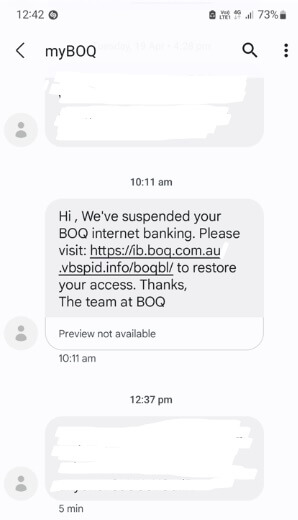
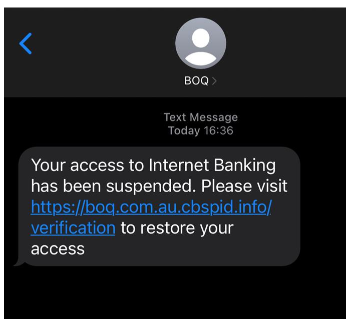
May 2022 - BOQ Phishing Text Message
BOQ has been alerted to a phishing text message that notifies you that your BOQ e-banking has been restricted. The text message contains a hyperlink that takes you to a fake BOQ Internet Banking log-in page.
The phishing website asks for your Customer Access Number (CAN) and password.
Just because the SMS has “BOQ” in the sender name doesn’t mean it’s real.
Provided the SMS service a scammer is using has the option for a send name, they can send it out using a familiar name. In fact, if you have already received messages from that name, your phone will combine them all, helping the ruse.
But there is one thing you need to pay attention to in order to prove the message is a scam: the URL or domain.
How the URL proves a scam message is a scam
You can’t fake a URL in an SMS or a web browser, and it’s something where if you pay attention to what you’re seeing, you can help ensure you don’t get scammed.
On an SMS, the URL should be what you’re going to. Do not click any links and do not provide your CAN or password that have the below in the URL:
au.cbspid
au.vbspid
au.auth-required
BOQ will never provide you with a link to log into your Internet Banking. Only access Internet Banking by typing www.boq.com.au into your internet browser.
Numbers the text messages are coming from include (but not limited to):
+61 497 823 077
If in doubt, contact BOQ via email at Financialcrimes@boq.com.au, by contacting your local branch, or on 1300 55 72 72, visit www.boq.com.au/contact-us for our operating hours.
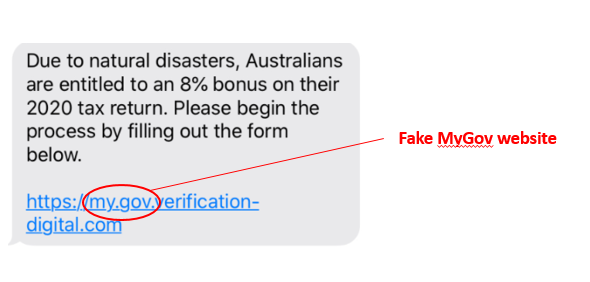
March 2022 – Scams Targeting Flood-Impacted Communities
Unfortunately, there are a number of scams to be aware of during the period after a Natural Disaster.
Scammers may pretend to be government agencies providing information on flood/disaster relief through text messages and emails ‘phishing’ for your information. These contain malicious links and attachments designed to steal your personal and financial information.
Scammers are also pretending to be Government agencies and other entities offering to help you with applications for financial assistance or payments for disaster relief.
Fundraising appeals often occur in the aftermath of a disaster. Unfortunately, some of these are scams.
What to look out for and how to protect yourself:
- Be cautious of all approaches you did not initiate, especially if you are asked to send money online.
- Confirm the identity of the contact by calling the organisation directly. Do not respond to the contact if you’re not 100% sure.
- Do not disclose personal information in a phone call, such as sharing your bank account screen, reading out passwords, or providing personal information or login details to MyGov.
- Trusted organisations will not ask for an upfront payment to process recovery payments. Requests from Services Australia and government departments can be verified with a call to special hotlines made available on their websites.
- If you donate to an established charity or not-for-profit organisation, make sure it is registered. You can do this by searching through the Australian Charities and Not-for-profits Commission Charity Register - https://www.acnc.gov.au/charity/programs/map
If you have concerns about the legitimacy of correspondence, contact us directly via email at Financialcrimes@boq.com.au or using the details on our Contact Us page.
If you think you have paid money to a scammer, contact your bank immediately.
Helpful Links and resources:
https://www.cyber.gov.au/report-and-recover/recover-from/scams
https://www.scamwatch.gov.au/types-of-scams/attempts-to-gain-your-personal-information/phishing
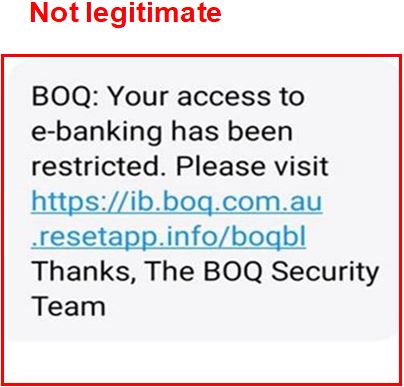
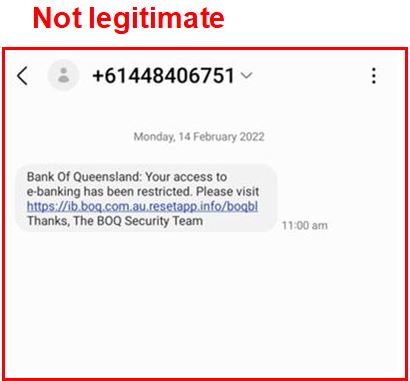
February 2022 - BOQ Phishing Text Message
BOQ has been alerted to a phishing text message that notifies you that your BOQ e-banking has been restricted. The text message contains a hyperlink that takes you to a fake BOQ Internet Banking log-in page. The phishing website asks for your Customer Access Number (CAN) and password.
If you receive such a text message, do not click any links and do not provide your CAN or password. BOQ will never provide you with a link to log into your Internet Banking. Only access Internet Banking by typing www.boq.com.au into your internet browser.
Numbers the text messages are coming from include (but not limited to):
0448406751, 0488066702, 0448667492, 0448579987, 0401612002, 0467361937
0467686381, 0448347159, 0487110981, 0475843120, 0438404505, 0499616961
0448220275, 0488342114, 0448639221
If in doubt, contact BOQ via email at Financialcrimes@boq.com.au, by contacting your local branch, or on 1300 55 72 72 , visit www.boq.com.au/contact-us for our operating hours.
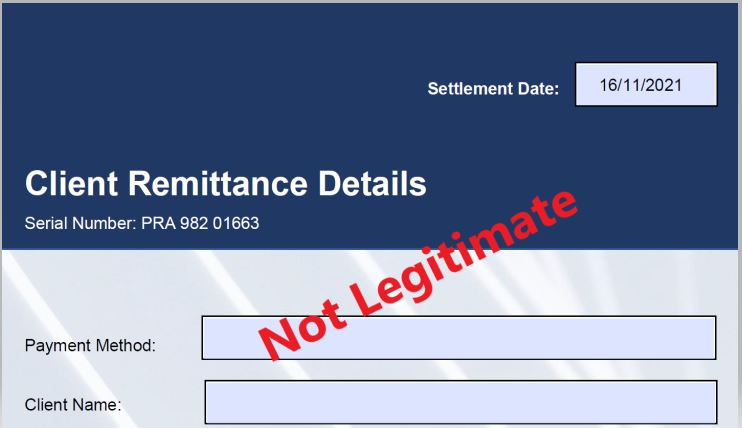
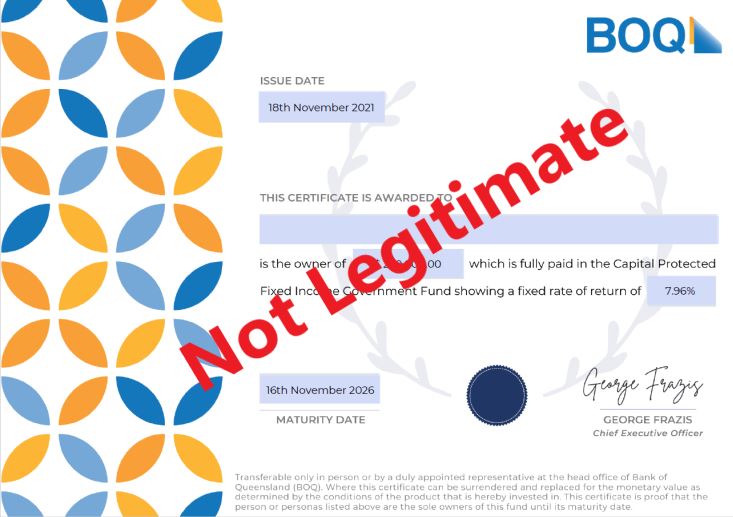
November 2021 – BOQ Branded Capital Protected Fixed Income Government Funds Scam
BOQ are continuing to report the prevalence of BOQ branded imposter investment scams, similar to what ASIC reported in January. Scammers are attempting to adopt the identities of legitimate BOQ employees and claiming to be selling BOQ Treasury Bonds or Capital Protected Fixed Income Government Funds.
Investors may be targeted from completing enquiry forms, via some third-party or comparison sites, or expressing an interest in investing online.
The imposter reportedly initiates and maintains contact with interested parties, sometimes over an extended period of time. During this time they may provide application instructions, maturity dates, investment thresholds, and other specific details surrounding possible investment options.
What to look out for
· Unrealistically high returns or bonds which seem ‘too good to be true’.
· Consistent pressure to invest due to the ‘risk of missing out’.
· Professional looking forms or prospectuses with either:
o ‘lookalike’ email addresses (e.g. info@boqau.com, david.freeman@boq-investments.com, )
o non-genuine phone numbers (e.g. 07 3999 7455, 02 9136 2538)
· Unusual requests for personal information.
· Being asked to pay funds directly into a bank account.
If you have any concerns about the legitimacy of correspondence, please seek independent financial advice or contact us directly (either via financialcrimes@boq.com.au or using the details on our Contact Us page).
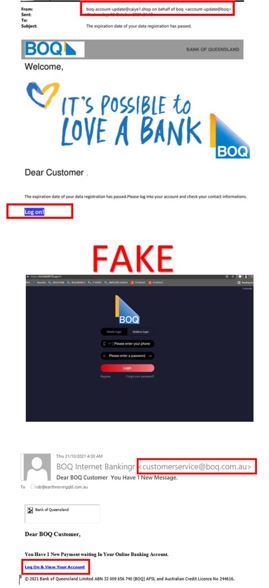
October 2021 – BOQ Phishing Email
BOQ has been alerted to a phishing email that advises you have a new message in your online banking account. The email contains a hyperlink that takes you to a fake BOQ Internet Banking log-in page. The phishing website asks for your Customer Access Number (CAN) and password.
If you receive such an email, do not click any links and do not provide your CAN or password. BOQ will never provide you with a link to log into your Internet Banking. Only access Internet Banking by typing www.boq.com.au into your internet browser.
If in doubt, contact BOQ on 1300 55 72 72, visit www.boq.com.au/contact-us for our operating hours or email Financialcrimes@boq.com.au
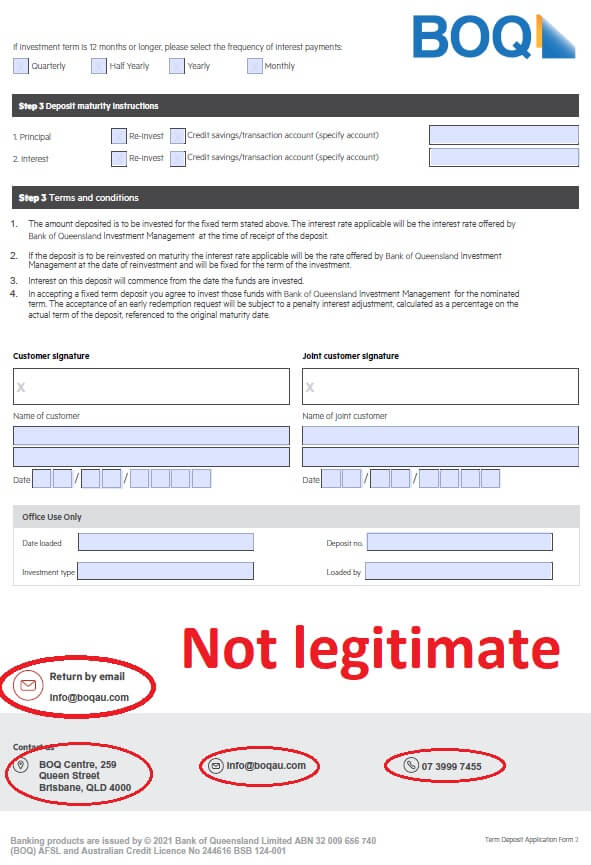
October 2021 – BOQ Branded Imposter Bond Scam
We have been made aware of a BOQ branded imposter bond scam, similar to what ASIC reported in January. Scammers are attempting to adopt the identities of legitimate BOQ employees and claiming, “to be selling treasury bonds at 5.75%”.
Investors may be targeted from completing enquiry forms, via some third-party or comparison sites, or expressing an interest in investing online.
The imposter reportedly initiates and maintains contact with interested parties, sometimes over an extended period of time. During this time they may provide application instructions, maturity dates, investment thresholds, and other specific details surrounding possible investment options.
What to look out for
- Unrealistically high returns or bonds which seem ‘too good to be true’.
- Consistent pressure to invest due to the ‘risk of missing out’.
- Professional looking forms or prospectuses with either:
- ‘lookalike’ email addresses (e.g. info@boqau.com)
- non-genuine phone numbers (e.g. 07 3999 7455)
- Unusual requests for personal information.
- Being asked to pay funds directly into a bank account.
If you have any concerns about the legitimacy of correspondence, please seek independent financial advice or contact us directly (either via financialcrimes@boq.com.au or using the details on our Contact Us page).

September 2021 – Apple iOS, macOS and Safari vulnerabilities
Apple have identified two vulnerabilities in the operating systems of multiple devices (e.g. iPhone, iPad, Apple Watch, MacBook). This Australian Cyber Security Centre (ACSC) alert lists the operating systems affected.
Some vulnerable devices may be exposed to being infiltrated by hackers who can execute code to install malware or take other actions. All without the user clicking any links. This may enable criminals to steal personal data or interfere with, or compromise, banking services.
How to protect yourself
- Update your Apple mobile and laptop/personal computer devices immediately.
- Setup automatic software updates on your mobile devices and laptops/personal computers.
- Install reputable antivirus and anti-theft/loss protection software, only from official sources (e.g. App Store or Google Play Store for mobile devices).
- On mobile devices, adjust settings to require a password before installing new applications.
- Avoid letting your device automatically connect to new WiFi networks without confirmation.
- Consider registering to the ACSC Alert Service.
If you have any concerns of your banking services having been compromised, contact BOQ urgently on 1300 55 72 72, visit www.boq.com.au/contact-us for our operating hours. or email financialcrimes@boq.com.au

June 2021 – Ponzi/Pyramid Scheme Apps
BOQ customers have recently been falling victim to Ponzi/pyramid scheme apps, such as the ‘Hope Business App’.
A Ponzi scheme is an investment scam, where participants are paid profits from the funds collected from new participants. Often, participants must pay an up-front fee, around $200-$500, before they can start earning. The schemes then use this joining fee to pay the ‘commission’ or ‘service rewards’ of earlier participants.
Early participants may see some return of funds and thus believe the scheme to be legitimate. However, some BOQ customers have reported being unsuccessful in cashing out any funds from these apps.
You can read more about this from a recent Queensland Police post.
What to look out for
- Substantial up-front or ‘joining’ fees.
- Promises of high returns with little or no risk.
- Pressure to invest further funds.
- Apps removed from Apple’s App Store or Google’s Play Store.
- Unregistered company who ‘promotes’ the app or scheme.
Remember, if it’s too good to be true, it probably is. If in doubt, contact BOQ urgently on 1300 55 72 72, visit www.boq.com.au/contact-us for our operating hours..

May 2021 - Threat and Penalty Scams
We have seen a rise in Threat and Penalty Scams made against our customers.
Scammers have been calling BOQ customers and impersonating legitimate government or law enforcement agencies. The scammers make threats of arrest, legal action or compromised account activity. Scammers then ask customers to make a payment to them or to a 'secure account'.
To appear legitimate, some scammers may ask for the customer’s local police station and claim they will receive a phone call. These scammers then spoof (imitate) the police station’s phone number in order to convince the customer of the legitimacy of the call. Unfortunately, this has resulted in some BOQ customers falling victim and making a payment to the scammers.
If you receive any calls claiming to be from a government department or law enforcement agencies making similar threats, hang up the phone immediately. Call the government department or law enforcement agency back on a trusted number e.g. from their website.
If in doubt, contact BOQ urgently on 1300 55 72 72 visit www.boq.com.au/contact-us for our operating hours.
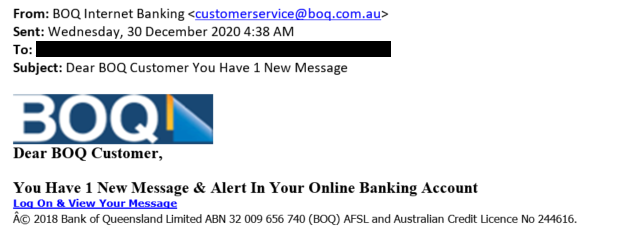
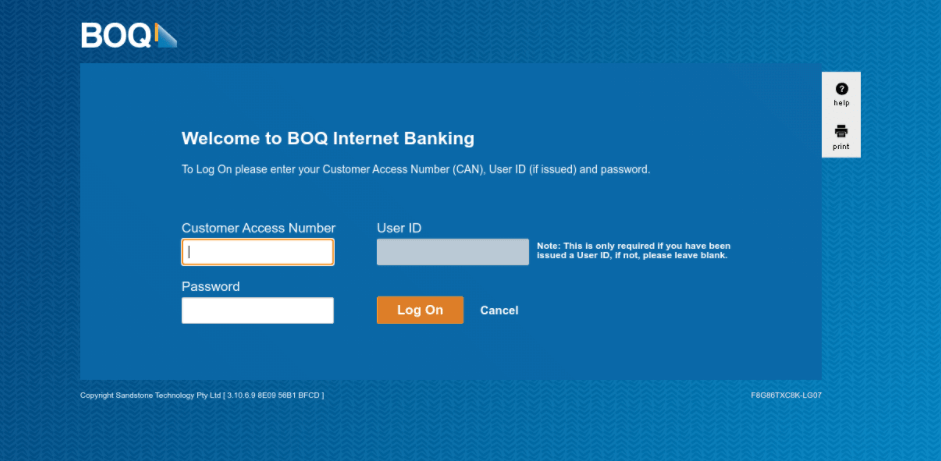
December 2020 - Phishing
BOQ has been alerted to a phishing email that advises you have a new message in your online banking account. The email contains a hyperlink that takes you to a fake BOQ Internet Banking log-in page. The phishing website asks for your Customer Access Number (CAN) and password.
If you receive such an email, do not click any links and do not provide your CAN or password. BOQ will never provide you with a link to log into your Internet Banking. Only access Internet Banking by typing www.boq.com.au into your internet browser.
If in doubt, contact BOQ urgently on 1300 55 72 72, visit www.boq.com.au/contact-us for our operating hours.
September 2023 – BOQ Impersonation Scam
BOQ are aware of a new fraud trend where customers are receiving phone calls from UK based third parties claiming to be representatives of the bank.
During these calls, scammers will pose as employees from Bank of Queensland and attempt to gain a large amount of personal information from you, often including full legal name, Internet Banking log in information, Visa card numbers, date of birth and one-time verification codes.
Using this information gained from you, the scammers will then use a number of techniques to gain access to your funds.
The scammers may attempt to:
- Complete fraudulent charges on your card by adding your card number to their digital wallet,
- Pose to be you in order to make changes to your banking profile including increasing daily limits, resetting your Internet Banking password or changing your contact details,
- Log in to your Internet Banking profile to access your funds.
What to look out for:
- Unsolicited calls, emails or text messages claiming to be from BOQ (remember scammers can mask what number they are contacting you from and whilst it may appear to be genuinely from BOQ it could still be fraudulent)
- Requests for sensitive information from someone claiming to be BOQ
- Urgent or threatening language
- Communication with grammar or spelling errors
How to protect yourself:
- If you receive an unexpected call from someone claiming to be BOQ or another authority, hang up the call immediately and call the organisation back via a trusted phone number.
- Never disclose personal information and card numbers or other banking information on an unsolicited phone call.
- If you receive any suspicious correspondence, stop and call BOQ immediately to confirm if it is genuine.
If in doubt, contact BOQ:
- To report a fraud or scam, attend your local branch or call us immediately on 1300 55 72 72 (Monday-Friday, 8am-8pm AEDT, and Saturday 9am-5pm AEDT).
- Report a cybercrime or cyber security incident to the ACSC via ReportCyber at www.cyber.gov.au/report, or call the Australian Cyber Security Hotline on 1300 CYBER! (1300 292 371).
